#its the only way to get character growth and plot developement
Explore tagged Tumblr posts
Text
On Wuk Lamat, and Female Characters in FFXIV
The Thing with Wuk Lamat is you can tell me you think she had too much screentime; you can give me numbers on how many lines she had or how many scenes she's in relative to other characters or other expacs; you can prove to me "objectively" that she gets more focus than other main NPCs; you're simply not going to convince me that this is something I should be unhappy about. And not just because it's silly to think you can use numbers to prove a story is good or bad and make someone else go, "Wow, you're right, let me just throw away all the joy I experienced with this story and revise my opinion because you've scientifically proven to me that I'm wrong."
Because while I love Final Fantasy XIV and I have greatly enjoyed its story in so many ways, fundamentally one of my biggest beefs with this game has been how much female characters have been denied complex character arcs and growth and agency and interiority.
Minfilia gets treated as a sacrificial vessel who lives for everyone but herself and doesn't even get to have feelings about her own death because that entire arc is focused on a male character's angst about it instead. The game tells us in the Heavensward patches that Krile sees Minfilia as her best friend and then just forgets about that later and never follows up on what that loss must have meant to her. Ysayle is basically right about most of what she's fighting for but harboring a bit of self-delusion is apparently such a terrible sin that she has to pay for it with her life, while her male foil is deemed so worthy of salvation that there's a whole plot point about how important it is that we risk our lives and others' lives to save him. Y'shtola is a major character who's been around since the beginning, and the game keeps dropping maddeningly interesting things about her (apprenticed to a cranky old witch in a cave! saved her own life and the lives of her friends with an illegal and dangerous spell and it worked! reserved and undemonstrative yet regularly through her actions reveals herself to be deeply caring! disabled!) and then shows complete disinterest in following up on any of those things with the kind of depth and care shown to male characters with complex arcs like Urianger.
In general there is also a repeated thread of female characters being portrayed as weak or overly emotional: Minfilia is weak because she doesn't fight and needs to be eaten by a god in order to gain "a strength long sought." Krile is portrayed as not being able to pull her weight with the Scions (despite the fact that she actively keeps five of them from dying in Shadowbringers) and the only thing they could think of for her to do in Endwalker was be yet another vessel for Hydaelyn (hmm, that sounds familiar) and it's not until Dawntrail that she gets much actual character development in the main story and even that has to come alongside "Look, she can fight now so that means she's useful." (And I love Picto!Krile, I'm just saying, there's a pattern.) Alisaie, despite having very good reasons for needing to find her own path apart from her brother, is portrayed as having to prove herself when she returns, that she's "not the girl she once was," and "will not be a burden" (while Alphinaud is repeatedly given the benefit of the doubt and reassurance and affirmation from other characters even after he takes on responsibilities he isn't ready for and fucks up big time).
And if you follow me you know I adore Urianger, and I love Alphinaud and Thancred and Estinien too, so please don't misunderstand what I'm saying here! I'm not knocking those characters, or saying we shouldn't also love them. I just use them as a comparison to demonstrate how the female characters have been neglected.
Lyse has some of the stronger character development among the female Scions, and while she's still kind of portrayed as being too emotional and hotheaded in early Stormblood, I think it's actually explored in more depth in a way that I like; Lyse has good reasons for wanting to fight for her nation's freedom, but having been away from Ala Mhigo for several years now, she needs to understand the stakes for the people who've been there fighting for years, what they've lost and still have to lose. She grows as a person and rises to the challenge of leadership, and I'm even okay with the fact that she leaves the Scions afterward because it feels right for her to stay in Ala Mhigo, and at least she doesn't die.
And by all accounts she was, like Wuk Lamat, widely hated when her expansion came out.
Unironically I think the other female Scion with the strongest character arc is Tataru. She tries to take up a combat job, finds that it's not for her, and decides to focus on where her strengths are instead. In doing so, she both holds the Scions together as an organization in the absence of a leader by capably managing their finances, and also comes into her own as a businesswoman and makes international connections that benefit both the Scions and her personally. In contrast to Minfilia, she's not portrayed as weak because she doesn't fight, and is actually allowed to be an important character who's good for more than being sacrificed. Tataru is still distinctly in a supporting role for the player character, however, and her character arc happens as a side story that takes up a relatively small amount of screentime over several expansions, which I think is probably why she doesn't evoke such a negative reaction.
But there is a pattern of the game's writing showing disinterest in the interior lives of female characters generally, and in making their growth the focus of a story.
So yeah, I'm going to be happy about Wuk Lamat! I'm going to enjoy and celebrate every moment of her character arc, of her personal growth, of watching her put the lessons she's learned into action. I'm going to love and treasure every moment when she gets to be silly, embarrassing, emotional, scared, grieving, confused, upset, seasick, impulsive, and still deemed worthy of growing into a hero and a leader. I will love her with all of my soul and you simply will not convince me that it wasn't worth the screentime after such a profound imbalance for basically the entirety of the game. We've never had a major female character get such a strong arc with this much love and attention put into it and that means more to me than I can truly say. The backlash to it is disheartening, as this kind of thing always is, but I'm not going to let it ruin the wonderful experience I had playing it and how much joy it continues to bring me.
And for those of you who don't want any of that for a female character, thank goodness you have Heavensward and Shadowbringers and Endwalker and no one can take those away from you.
(And if you follow me you know that I love Shadowbringers and Endwalker and have very fond memories of Heavensward despite some issues with it, so not only can I not take that from you, I am not trying to!)
Some of us have been real hungry for a character like this with an arc like this, so, I think, y'know, maybe we can have that. As a treat.
#this has been sitting in my drafts#i held off on posting it and i'm tagging minimally#but yeah i still feel this#wuk lamat#ffxiv stuff#afk by the aetheryte#dawntrail spoilers#ffxiv critical#anne's ishgardian salt rock#dawntrail
346 notes
·
View notes
Text
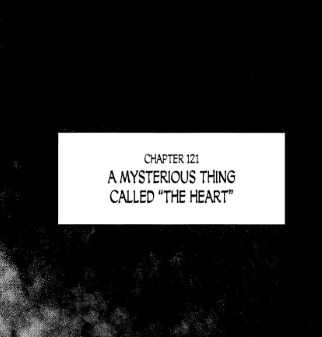
A Mysterious Thing Called "The Heart": Akutagawa’s Evolution in Bungo Stray Dogs and again not too detailed but a lot of THOUGHTS
In the latest chapters of Bungo Stray Dogs, Akutagawa Ryuunosuke’s character arc has reached a profound turning point (well it usually does, he has a slow and gradual and good development.) After losing his memories or so it seems, he only regains them in the wake of Atsushi’s self-sacrifice, an event that carries immense weight given their history. This development not only ties back to recurring themes in Akutagawa’s story but also resonates with Asagiri’s earlier work on him, particularly the short story The Heartless Cur. The significance of this title alone—"cur" referring to a stray dog, an outcast—echoes his core struggle with identity, worth, and the pursuit of strength. Now, with the latest manga title, A Mysterious Thing Called "The Heart", we see the final steps of this journey: the realization of what it means to protect, to be selfless, and to truly understand one’s own heart.

The Struggle for Worth: From The Heartless Cur to not quite understanding The Mysterious Heart
Akutagawa has long been plagued by the idea that only the strong have value. His harsh upbringing in the slums and Dazai’s ruthless mentorship reinforced this belief, leading him to adopt a mindset where power dictated one’s worth. The Heartless Cur explores this concept deeply, portraying Akutagawa as someone whose existence is defined by violence and survival. The title itself suggests a being without purpose beyond its primal instincts—an apt metaphor for the way Akutagawa saw himself.
Yet, in the present timeline, something shifts. Akutagawa’s repeated confrontations with Atsushi force him to acknowledge a different kind of strength—one rooted not in destruction and not just in protection, but from within oneself. This realization is crucial, as it reframes his view on what it means to live and fight, and importantly get rid of the Dazai obsession to which I am glad he lost that coat, which to me in a way is like the "watch" in beast for Atsushi. The title of the newest chapter, A Mysterious Thing Called "The Heart", directly contrasts his previous mindset. Where once he believed himself heartless, unworthy, and merely a weapon, he now finds himself understanding the weight of sacrifice, the worth of another’s life, and, ultimately, the meaning of his own (hopefully asagiri doesn't mess this up, but I believe in him so I'm sure all will turn out great just with a lot of lore dump and excessive plot armor with no deaths until wayyy later on. Ahem, but anyways.)
From Selfishness to Selflessness: The Parallel Between Akutagawa and Atsushi
One of the most striking aspects of Akutagawa’s sacrifice is how it mirrors Atsushi’s own. Both characters have operated on deeply ingrained selfish desires—Akutagawa seeking validation through strength, Atsushi yearning for affirmation that he deserves to live through saving. Now I know I mentioned this before, and I keep mentioning it, because to me its important to add. Their growth has always been intertwined, clashing and evolving through their battles. However, the defining moment of Akutagawa’s return to consciousness—when Atsushi sacrifices himself and repeats Akutagawa’s words—highlights a crucial transformation: their shift from selfishness to selflessness. In both of them in a way, even if Atsushi has put his life on the line to save others before it was not quite like he did here, without activating his ability (we're not sure if he really could or couldn't in the moment but lets add that here anyways.) to save Akutagawa at the expense of his own life and survival just as Akutagawa did for him, sacrificing his own life, his own selfish need for survival even if he stated he does not mind death for the knowing the value of anothers' life. I know I said this before too but just let me write.
It’s a moment of complete reversal and similarity as these Yin-Yang boys have always shown, proving that the rival enemies have truly come to understand each other. Akutagawa regaining his memories at this precise moment reinforces the idea that it was just that big of a deal and how impactful his own sacrifice and development was and it shows the same for Atsushi.

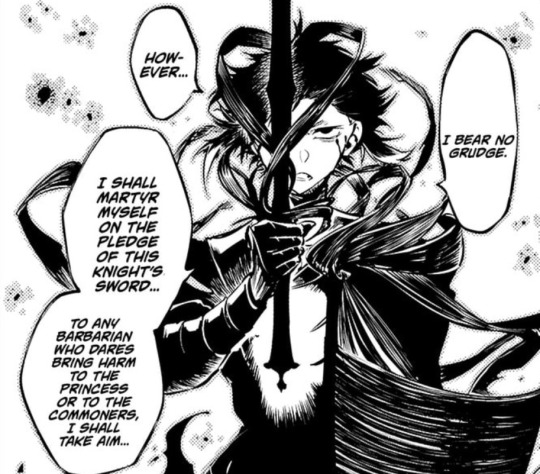
The Role of Rashomon: A Shield and a Blade
Rashomon has always been more than just an offensive ability. While it is known for its terrifying destructive power, its defensive capabilities reveal another side of Akutagawa’s character. This duality—destruction and protection—mirrors his own self. Initially, he wielded Rashomon purely as a weapon of aggression, but as he evolved, so too did his ability’s purpose. When he shields not just Rashomon shielding himself but when he raises his blade for others, this is a huge change - though I believe Knight Aku has much to explain especially I hope asagiri tells us if this is a singularity of bram and akutagawa or not. Which may take months.
This theme of protection is not new. In 55 Minutes, after dying in flames, Akutagawa retained memories that should have been erased—a testament to how deeply certain experiences impact him. Likewise, in his vampire state, he still exhibited a sense of control, sparing Aya and ultimately keeping his promise despite being under mind control. Now I know when it said the heartless dog/emotionless child felt emotion for the first time it was hatred before going on that killing spree. But after all this it does show. These moments underscore a crucial truth: Akutagawa has always had a heart, even when he believed himself heartless or is shown to be. (I will write more on this in another post, I know I keep saying that too, but it will happen and it will have to do with an interesting thing of Akutagawa's character being written and possibly shown in the "Rashomon Effect" you can research it if you don't know it already.)

The Weight of Words: From the Trembling Dark World
Akutagawa’s theme song, From the Trembling Dark World, captures the essence of his character’s struggles at least what they used to be. The lyrics paint a picture of someone who has always been fighting—against the world, against himself, against the fear of being weak:
"A longing as strong as
A reason to live even when I’m unable to breathe
From the trembling dark world, always." It may not specifically be his reason to live but this says its "a longing as strong as a reason to live." This reflects the pain and determination that have defined his journey. The idea of pressing forward despite suffering is central to his story, but not just that but it shows just how important again that longing for approval and to be told he is strong and worthy to live is, which we all know funnily enough is what he mocked atsushi for before. Though they are so the same and different and I could go on forever about every little detail of their sentences to each other but not now, unfortunately. Another significant line is:
"Unreachable no matter how much I writhe."
Dazai’s influence is evident here (when is it not when it comes to Akutagawa?). Akutagawa was shaped by the expectation that he had to be strong to matter, that to stop moving forward was to be left behind. Yet, the lyrics also suggest a yearning for something beyond this endless struggle.
The song’s repetitive line is particularly poignant:
"Weak, weak and it's not enough."
This shows us a lot, or well kind of, within the last chapter in the manga and besides his endless yearning for strength and Dazais acknowledgement which is meant by this line in the song back probably around 8 or more years ago... His willingness to die not for power or recognition but for someone else’s survival is the ultimate proof that he has changed. The once "heartless cur" has found his heart—not in words, but in action. Funnily enough before he died he had a nice conversation with Fukuchi on what his last words would be, and he said he prefers actions, but what do we get... "Away with you...you fool."
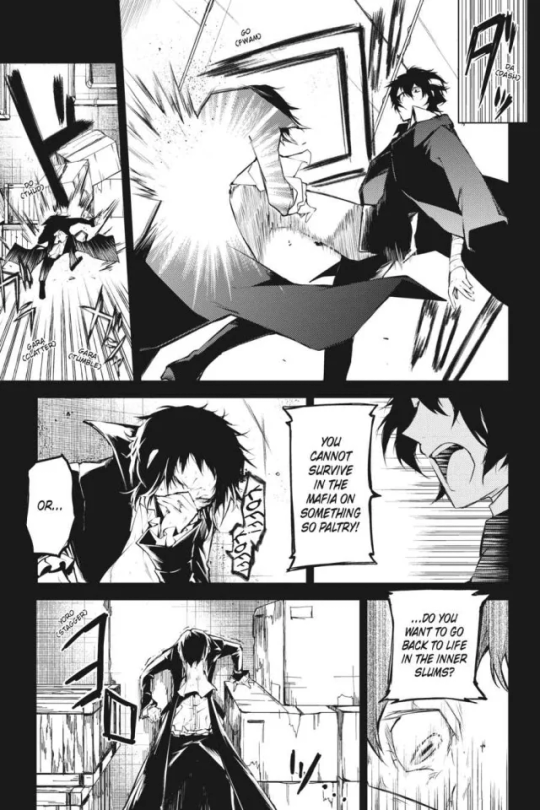
Lets also not forget how important this cycles and webs are of connection, manipulation, abuse etc. But considering that, remember how Akutagawa threatened Kyouka with getting thrown into a dark world/slums? How he described it... Well I need to re-read and get a better perspective or coherent thoughts on it but I'm sure it was said that Dazai threatened him with the same thing, to be sent back if he didn't do good. Which would of course make Akutagawa all the more "grateful" for being taken in and trained to be "strong" because like he's seen all his life only the strong survive, and the worthy get to live at the "top" of the world. Its funny how this kind of even gets added into his likes as the things he likes are very refined so to say, to show he is no longer down there. But I see how Dazai probably saw a piece of himself in Akutagawa, killing, empty eyes, looking for a reason to live - and decided to try and give him one in the way he knew too. At that time Dazai was in the Port Mafia he was a very different Dazai from the ADA one, his methods and his ideas...all quite different that its obvious what happened there with him and Akutagawa. And how Akutagawa saw himself in Kyoula (interesting she was 11 or around there when she joined wasn't it or was it 12-13? similarly to when dazai found Akutagawa) he said he saw the same eyes he knows, because he too had the same eyes. But now she has found the light, and a reason for living besides killing, a place to belong that doesn't hurt her constantly. (While he got that yes, but the place he belonged was void of the person he was waiting for approval from, and it definitely did not help in his mental state and health or help him much in any ways as the ADA did for Kyouka as we see his eyes are still the same, dark but now with determination.
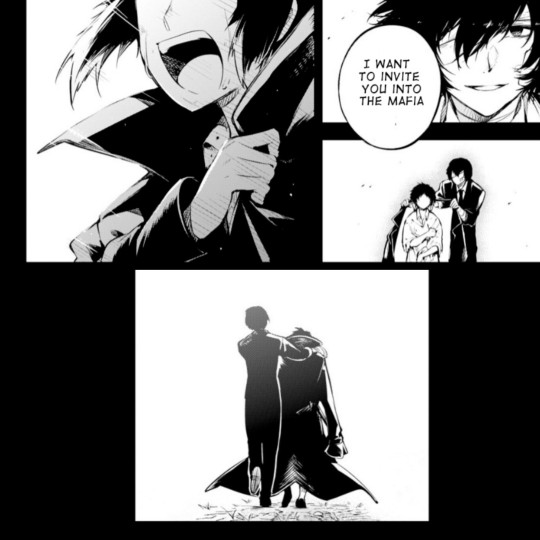
Also a random mention to later chapters just because Akutagawas eyes are important to me (as everything in his character is important to me.)
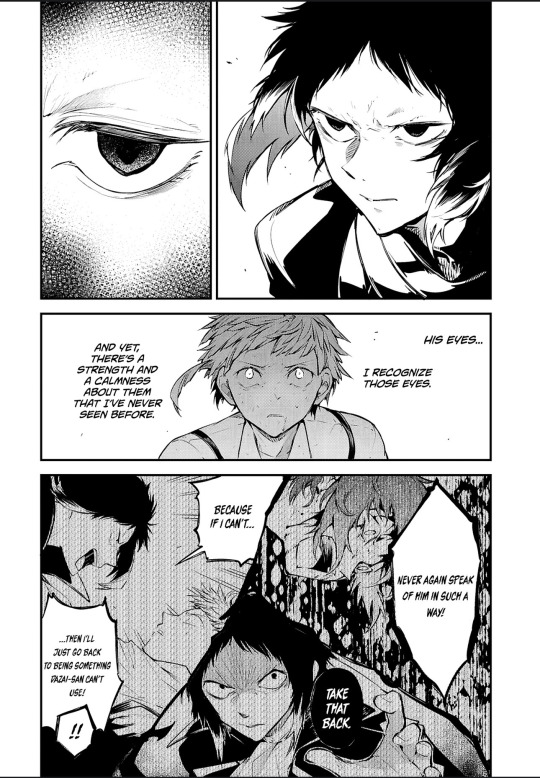
And perhaps, in the end, he was never truly heartless—he just needed someone to remind him that his heart was always there, waiting to be acknowledged. Kind of like Yosano who was used for her ability, but never had her kindness acknowledged until Ranpo invited her to the Agency.
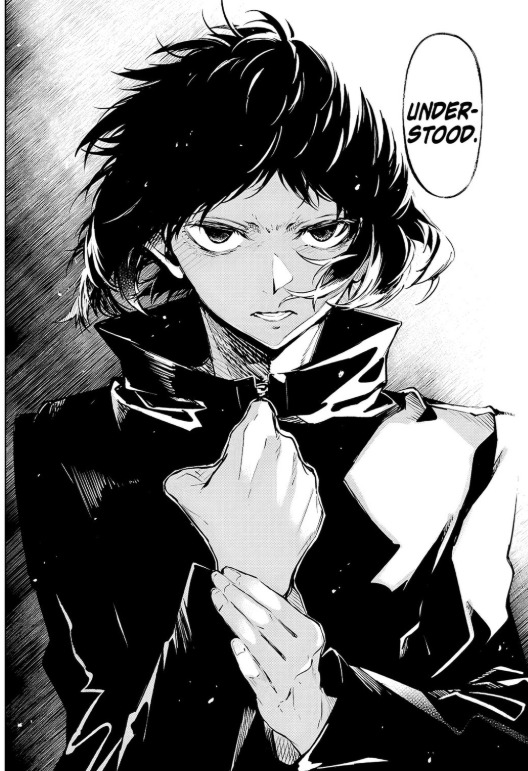
(Also random thing to add but I enjoy canon way too much to consume too much fanon content so I prefer keeping away most of the time so I can keep my thoughts and theories/analysis of things clear and to do with canon so things don't get blurred or messed up or have mischaracterization or information errors. But if you do find any or have anything to say about it please do.)
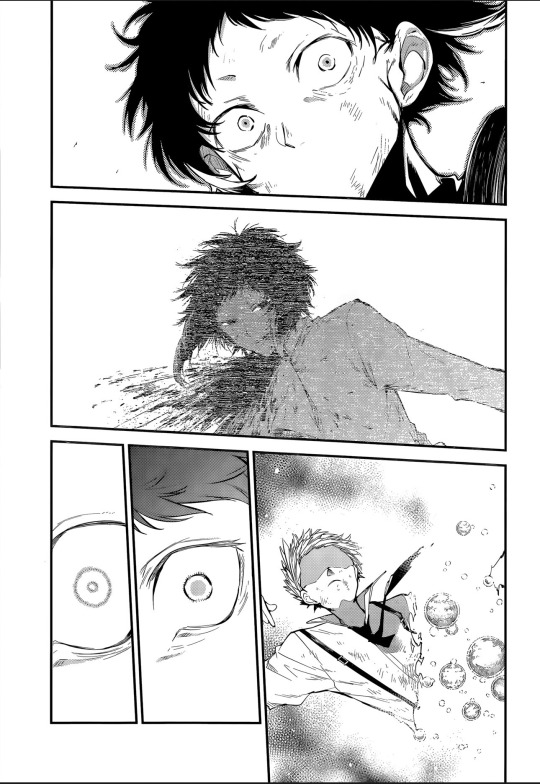
I wrote before about his eyes in another post probably twice or more times as I always like mentioning it... But just to add:
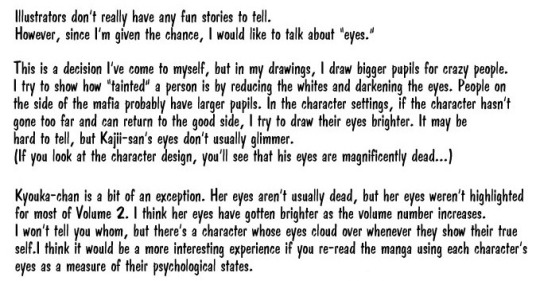
On a side note I feel like Harukawa was talking about Tanizaki who we know will soon probably have more relevance with Naomi or something.

His eyes always turn completely dark. And he was said to be good enough to be in the mafia before. Not to mention when Yosano said she wouldn't go back he offered to go. And reading back Harukawa said that mostly those in the PM are like this. But anyways. Hope the rambling ended up alright, I'll end the series of thoughts and analyzing for now.
~ Hope your brain isn't as fried as mine, end of The Akutagawa Fan, Charkoala, Caldera posting until the next few hours.
#Bungo Stray Dogs#Bungou Stray Dogs#bsd beast#bsd manga#bsd spoilers#bsd akutagawa#bsd atsushi#bsd tanizaki#bsd chapter 121.5#bsd eyes#bsd dazai#bsd analysis#bsd theory#bsd essay#bsd thoughts#akutagawa ryuunosuke#dazai osamu#atsushi nakajima#tanizaki junichiro#kyouka izumi#character song#bsd chapter 88#bsd chapter 117#bsd chapter 119#bungo stray dogs#bsd
69 notes
·
View notes
Text
Why Timebomb shouldn't exist in s2 (part 1 - Ekko)
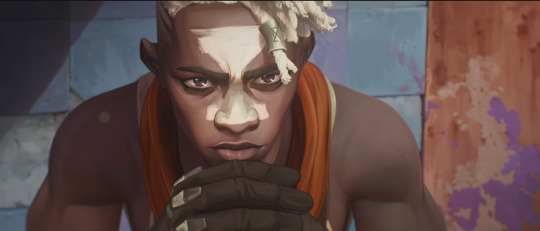
Let's start by analyzing his character. Don't you think there's something wrong here, to put it mildly? Of course, I'm laughing at jokes about the fact that you can't call any character absolutely good in Arcane except for Ekko, but… Don't you think this is a problem? Ekko has no flaws at all. If he didn't have difficulties as the story progressed (and there aren't many), he would literally be Mary Sue.
And okay, even though I find characters without flaws completely unrealistic and boring, it's possible to work with this. Let Ekko be a good guy. Just give him a good conflict and it will be enough to make him interesting to watch.
But there are problems here too. What conflicts does Ekko have?
Chembarons. It's clear with Silco, he died in s1, and this conflict is half gone. But only half, because other chembarons want to take his place. The development of this topic could serve as a good disclosure of Ekko's character. His confrontation with shimmer and Silco in the hope of changing Zaun for the better with his defeat will endow him with flaw - naivety (this is just speculation, because we don't know if Ekko knew that eliminating Silco wouldn't have changed anything - we can only see that how he sighs at this information in s2 ep2). But making him naive is good, because it would give him an opportunity for growth and an additional character arc, because the question arises - what will he do? Fight against the "bad guys" as before or change his approach? Will he get his hands dirty or will he find a "better way"? Perhaps he will try to unite Zaun? Maybe he'll become a chembaron himself, but as a good chembaron? Well, we won't find out, because thanks to Caitlyn for doing all the dirty work - this conflict disappeared on its own.
The Tree. Ekko's personal arc in the s2, which is just drained down the toilet. And no "he ended up in another timeline and then there was a war" is not an excuse, because his entire motivation in s2 is based on this conflict. He starts his journey precisely because of the Tree, but they brushes it aside for the sake of fanservice and a more global plot. Lack of timing is not an excuse for the same reason - fanservice in another timeline is not needed for s2. Exploring Tree and firelights would give a lot of information about Ekko himself. How did he become a leader? Was there anyone who was against his leadership? What personal connections does he have with firelights (friends, mentors, etc)? One such small flashback could reveal his character much more than the entire ep7.
Piltover. Weeeeell, since we have been ignoring the topic of Piltover oppressing Zaun for decades, this conflict disappears by itself. We have more important things to do, like fighting an army of creepy robots and Arcane Jesus.
Jinx. Fucked up on all fronts. Cheap fanservice with alternative Powder instead of revealing his complicated relationship with our Powder/Jinx. I'll explain more later.
In total, we have: Ekko, a character who has not been fully revealed, who does not have depth like other characters (shown on the screen, rather than having to figure it out by ourselves) and whose conflicts either resolve themselves or are forgotten. It was more important for the creators to devote time to the fanservice than to reveal Ekko as an individual and close his personal arcs. Moving to another timeline cuts off the possibility of revealing his relationship with other characters besides Heimerdinger (yes, with Jinx too, but more on that later). But there's also a problem with Heimerdinger, because well, he's so small and fluffy and has a cool mustache, and that's probably why Ekko completely ignores the fact that Heimer was a councilor to the city who had been oppressing Zaun for decades (seriously, Ekko doesn't bring up this topic and has no complaints about Heimer, because creators deliberately omitted this conflict, forgetting that it is illogical for the character as Ekko).
Part 2 - Jinx Part 3 - Relationship
120 notes
·
View notes
Text
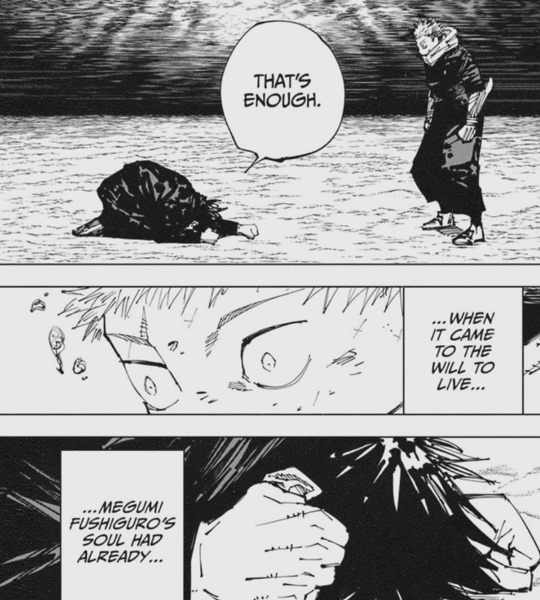
Megumi Will Start the Merger Theory
You heard me. I know this sounds wild and out of left field, but it's just a theory. A Jujutsu Kaisen theory. I fully acknowledge it might not happen, but please stick around long enough for me to argue why I think Megumi's character may go in this direction.
This one is for all the Megumi corruption arc truthers out there. I came up with this theory when it became clear that saving Megumi from Sukuna's grasp was going to be more difficult than just giving him a motivational speech, or punching Sukuna until their souls separated. Furthermore, I believe that Jujutsu Kaisen's manga won't end with the defeat of Sukuna. There will be one more curve ball thrown at us by Gege in the late game, and this is me trying to anticipate the pitch before the baseball hits me in the face. Underneath the cut I will speculate on the direction that Gege may take Megumi's arc, the relationship between Sukuna and Megumi, and Yuji's role in the finale.
What is a Corruption Arc?
Before digging in too deep I want to explain what I mean when I say I'm a Megumi corruption arc truther. A character arc is a story arc in regards to a character where a character changes from beginning to end. That's the most basic definition, arcs can be more complex, some arcs are actually inversions of the standard character arc where a character is defined by his lack of change.
However, those still need some element change, sometimes characters around them change to show contrast. For example, Eren is a stagnant character from beginning to end in Attack on Titan, but characters like Mikasa, Armin, Jean all grow up to show by comparison how little Eren has grown. Sometimes circumstances change around a character, and their lack of growth is a failure to adapt to those circumstances.
A character arc requires a change, but it's not necessarily a positive change. Often called negative character development, these characters regress instead of grow. This happens in many ways. One of the most basic examples of a character arc is a want / need arc. A want / need arc shows an emotional hole in the protagonist's life that needs repairing and how resolving the plot allows them to fill that hole. The protagonist usually knows what they need, but they know what they want, and often what they want won't actually fix them.
For example if I'm feeling sad I want to eat donuts to lift my mood, but what I need to do is learn healthier ways to work through my negative emotions. A character who keeps pursuing what they want, instead of realizing what they need won't grow, that's negative character development.
That's just one example though, Gege gave us a blueprint for a corruption arc in Hidden Inventory.
In Yu Yu Hakusho the character Sensui (directly cited by Gege as his inspiration for Geto in an interview) once was a spirit detective like the protagonist. No one describes him as corrupt from the beginning, in fact he's constantly described as more pure and upstanding than delinquent Yusuke Urameshi who likes getting into fights. He has a strong sense of justice, but rigid black and white views that come with it. Once he's confronted with evidence that directly contradicts his demons bad, humans good paradigm he cannot cope, and the narrative all but states Sensui's purity traditionally a good trait corrupted him because of his inability to adapt and his rigidity in in his beliefs.
Sensui goes through a corruption arc, albeit one offscreen and mainly referred to in backstory.
Geto's happens onscreen in its own story arc where he is one of two main characters. Much like Sensui he's presented to us as a sorcerer like Gojo, but unlike Gojo he believes sorcerers are obligated by duty to protect non-sorcerers who have no way of fighting against curses. You could argue that in some ways Geto and Gojo are the same type of jerk, but Geto's principles are clearly set up to contrast Gojo who at that age only was a sorcerer to flex his abilities. Geto's friendship often has him lecturing Gojo about respecting others, paying special attention to Gojo's feelings in ways that other characters don't, and also not being afraid to clash with Gojo over differences in morals.
If Geto is corrupt from the beginning there's no arc there, so he's clearly set up as being the moral fiber to contrast Gojo. We are literally presented with a scene where Gojo admits he could kill the non-sorcerers who hired a bounty hunter to assasinate Riko and feel nothing, and relies on Geto to make a moral judgement in his place, that society will already punish them and their slaughter is pointless.
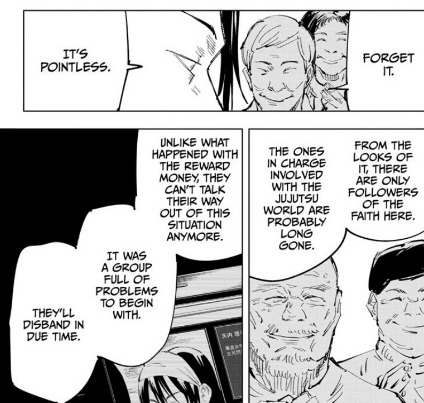
The irony is that later, Geto will engage in pointless slaughter killing an entire town in retribution for their abuse of Nanako and Mimiko. When Gojo confronts him about his actions, Gojo cites the same reasoning that Geto provided him to stop him from killing the cult members.
That Geto's murder of innocent civilians is pointless, because it won't achieve anything - his world of sorcerers is out of reach. Geto's clearly positioned as Gojo's moral tether, because he cites Geto's statement of only killing when there's meaning to it right back at him.
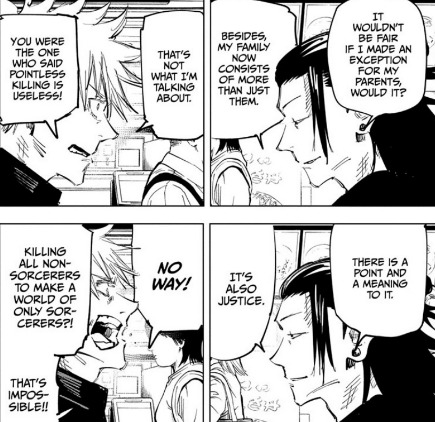
This is also where the corruption part of his corruption arc comes in, a change has taken place here. Geto hypocritically contradicts his earlier words, not just engaging in meaningless slaughter but also punishing people with his own hands instead of letting the justice systems in place take care of the punishments. Two things he held Gojo back from doing, only to do himself post corruption arc.
You could cite many things as the reason for Geto's corruption arc, but the common theme shared with Sensui is resistance to change. Geto saw the world in two distinct categories strong / weak, the same way Sensui saw humans good / demons bad. When Geto is shown that weak people are capable of bonding together to oppress strong people (the cult) and that sorcerers despite having strength are on the losing end of their society (they are expected to risk their lives and toil endlessly for curses 99% of the population can't even see), he cannot cope.
He especially cannot cope with the reality that Rika's death showed him, that he is not strong as he once believed. All of this combined leads Geto to double down, still seeing strong and weak as separate categories but now blaming normal citizens for the inherent corruption inside the Jujutsu World. Notice how Gojo a character with positive development seeks to reform from inside the Jujutsu World instead.
Geto also still wants to think of himself in the strong category, rather than facing the feelings that Riko's death and his helplessness in that moment gave him, as well as Gojo pulling he instead decides to double down on the idea that he's in the strong category, that he's superior.
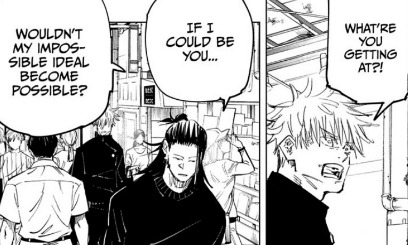
Geto even remarks jealousy at Gojo's godlike power for the first time, when before this he's always been the only person to treat Gojo as an equal - because Geto doubling down on his superiority complex begins imagining himself above others and therefore untouchable by trauma. It's also a grab for agency, because in this world sorcerers are rather agenciless, forced to be cogs in an unfair system. Geto incorrectly assumes agency = power. If he possessed Gojo's power he would be able to grab his agency back (which is simply incorrect because Gojo is one of the most agenciless characters in the manga, defined by his rigid role as the lynchpin of society).
Geto also doesn't mature. A mature adult lives in the world, and accepts that the world is imperfect. Geto is remarked as childish, first by Shoko when they are smoking together "sulking because no one understands you... sounds awfully childish if you ask me", and then by Yuta "You think you're a god? You sound like a kid!"
So we have, refusal to grow up, refusal to adapt to a complex world, resistance to grief, and grabbing for agency and power instead of fixing an issue inside himself - all of these combine to make the Jenga Tower that is Geto Suguru collapse.
The central question of Geto's arc, spoken by Gojo to Yaga is "Is it possible to save someone who doesn't want to be saved?"
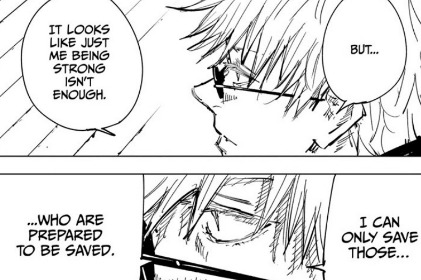
If Geto refuses all help, refuses to admit that he's wrong, and does not want to change then what really can Gojo do in this situation? Was he right to give up? Did he give up too early, refusing to kill Geto but also spending ten years just ignoring the problem until Geto attacked in Jujutsu Kaisen Zero? Did it not matter what Gojo did because ultimately Geto's choices are his own?
There's no clear answer, because it's a question the author is asking the audience to ponder. It's also a question directly set up for Megumi to answer, because when Gojo is unable to do a thing for Geto we see his next action is to seek out Megumi. His words imply that he sees Megumi in Geto and advises him not to be left behind, he also clearly became a teacher in order to not let what happened between him and Geto repeat in the next generation.
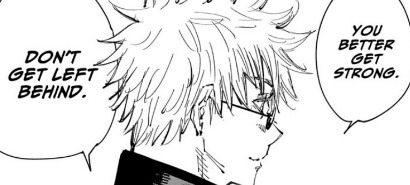
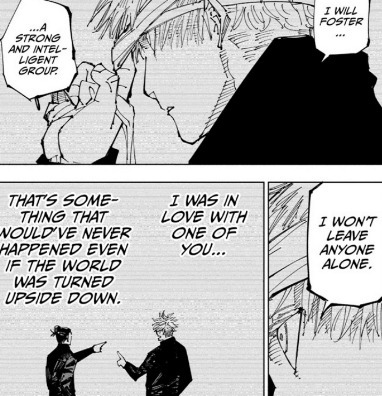
In spit of Gojo's best intentions, he's not able to protect Megumi from any of Sukuna's designs toward him, or basically anything that happens in post Shibuya's. Simply raising Megumi to be strong, did not prevent him from suffering trauma in his youth on Geto's level.
There's even a deliberate parallel, they both witness the death of an innocent who they promised to protect (Tsumiki, Riko Amanai) and they both have had their body taken from them, Geto's corpse is turned into a literal puppet to help advance Kenjaku's plans, Sukuna steals Megumi's body in order to revive himself in the modern era. They're both even used as tools against Gojo, Kenjaku uses Geto's body to awaken memories in Gojo and complete the sealing. Sukuna uses Mahoraga to learn the world splitting slash that cuts through Gojo's defenses.
Megumi also has a set of values that society spits in the face of. Megumi wishes to selfishly protect his sister, and pick and choose who to save. Geto believes the strong are obligated to protect the weak. Geto sees weak people who are corrupt and not worthy of his protection and also the reality that sorcerers are the exploited class, Megumi is forced to kill Tsumiki with his own hands.
These are intentional narrative parallels to show the risk of Megumi may walk the same path as Geto, especially since Megumi is in many ways a pure child like Geto himself.
Dark Phoenix Arc
There's one more corruption arc I want to compare Megumi's too, to give some idea of where I expect Megumi's arc to lead.
The Dark Phoenix Saga commonly refers to the story in Uncanny X-Men #129 - 138 of Jean Grey’s corruption by the power of the Phoenix and the Hellfire Club. It was considered incredibly shocking for its time. One thing to note is while Jean Grey is famous nowadays, in early X-Men she was the weakest character and her role was basically limited to “The Woman” of the team.
Elevating the helpless damsel woman to the most powerful member of the team, if not the entire universe and then having her turn evil had never been done before. It was a jaw-dropping shock at the time.
The reason I am citing the Dark Phoenix arc as an example, is because both Jean Grey and Megumi's character arc revolves around themes of agency, how it's stolen from them and how they reclaim it.
The basic summary of the Phoenix arc is that Jean Grey is initially given a massive power boost when she's possessed by the Phoenix. She stays behind on a crashing ship only to be saved by the Phoenix, a guardian, alien entity of immense power that was locked away in a crystal. Jean Grey returns as Phoenix with a massive power boost, but there's several ambiguous elements that compromise her agency. It's implied that Jean Grey always had a tremendous power that was in part sealed away by Professor Xavier using his telepathy (infringing on her agency) and that while the Phoenix gifted Jean Grey power, it's also an alien entity effecting her mind and body.
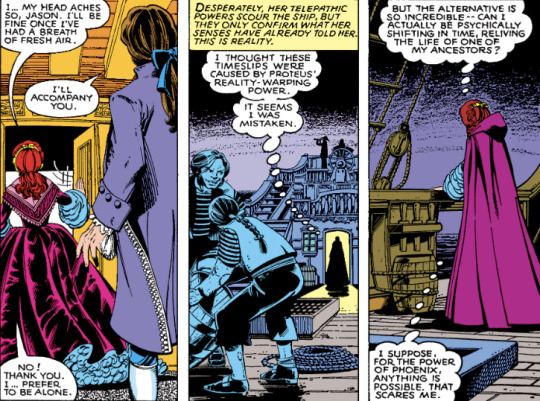
On top of that when she acquires the power, outside forces begin wanting to manipulate Jean in order to gain her power for their own ends.
A group called the Hellfire club begin to psychically tamper with her mind. They trap her in hallucination world where she is a woman of the 1800s, (not famously known for their agency) and in love with the leader of the Hellfire Club, even going so far as to give her false memories in order to convince her that this is reality.
The concept of agency and how it's constantly infringed upon, even by someone who's supposed to be on her side (Xavier) is central to this arc. Jean evetually escapes from the Hellfire club's manipulation, and reclaims her bodily autonomy but the story does not end there.
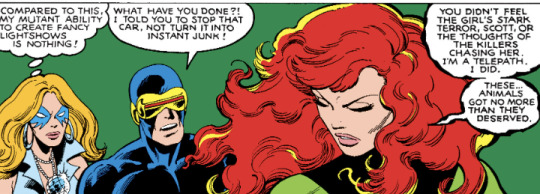
The subtle changes in Jean's behavior still continue, even after Jean has freed herself from the mind control. Is this the result of being given too much power at once? Is Jean losing control because she was never taught to properly handle her powers?
Jean Grey is also the character with the strongest potential in the main cast (much like Megumi) and also a character who's been prevented from using her powers to their full potential and even had her powers stolen and used by others (Much like Megumi).
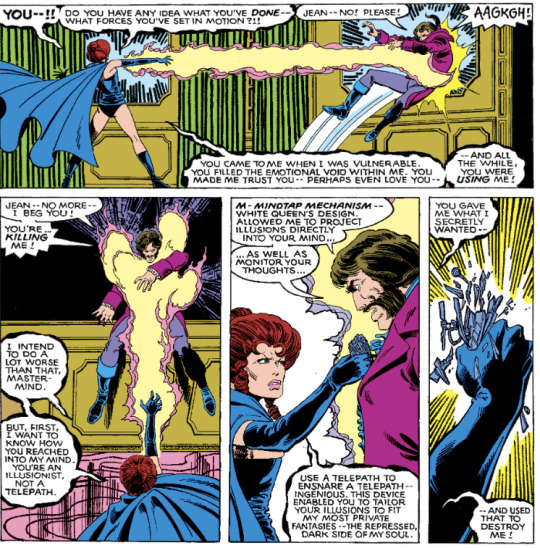
It's heavily important that Jean's corruption into dark phoenix happens after freeing herself, and in response to the Hellfire club's machination to take all agency away from her. Jean instead makes a grab for power and agency by abusing her power as Dark Phoenix.
Jean even mentions that turning against her friends and trying to kill them as Dark Phoenix, will sever the last tie holding her back, will get of Jean Grey for good and cause her to fully embrace being Phoenix.
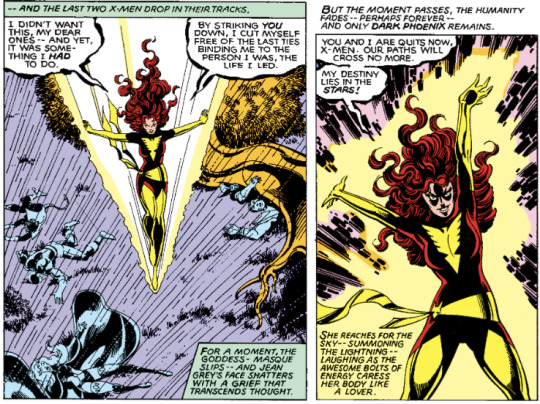
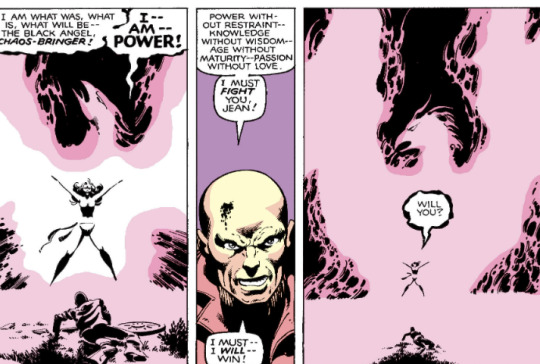
Jean has flipped entirely, overembracing the power and agency that has been stolen from her again and again, but really how could someone not desperately try to take back control of their lives after being mind controlled or having their mind violated multiple times (the phoenix itself, the hellfire club, even by Xavier).
How can someone never allowed to use her power, or given choices on how to use her power, not be corrupted when after being stepped on all of their lives the power of a god is dropped into their lap?
This is why I believe Megumi will be the one to initiate the merger, because his entire arc has been about having his power stolen away from him and what would Megumi do when given total power over the merger by Kenjaku?
Megumi Corruption Theory
The biggest piece of evidence for this theory is right here, Kenjaku specifically says to give Megumi Fushiguro the authority to start the merger.
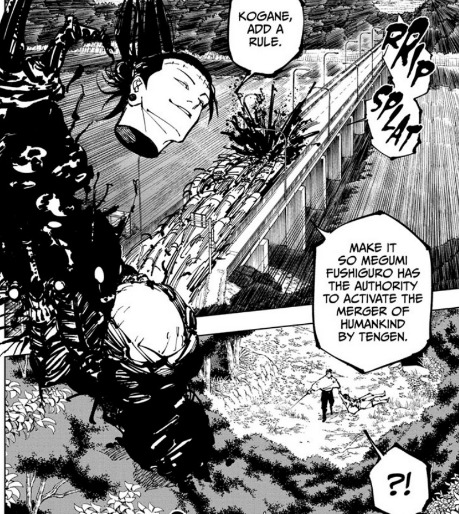
There's a technical reason for this, Sukuna is currently in Megumi's body, and Sukuna himself was actually registered in Yuji's place because Yuji was built by Kenjaku to be a cage for Sukuna.
However, it can also be read as foreshadowing. If you believe like I do that the merger has to happen, then Sukuna can't be the one to initiate it. The simple reason why is that the main characters will have to be alive to fight against a merger, and Sukuna has set the condition that he'll start the merger after killing the main cast in order to motivate them to fight him with everything they have.
If Sukuna is going to start the merger after killing all the main characters, then he can't be the one to start the merger because the main characters have to be alive to witness the merger take place and fight against it somehow.
Therefore, logically if the merger is going to occur the only person who could possibly activate it is Megumi Fushiguro after reclaiming his body.
There's more foreshadowing then this one instance however, and a lot of it revolves around Sukuna and Megumi's unique relationship and Sukuna's role as a character.
As for why Megumi would possibly start out the merger, it's the same as Jean Grey, a character denied of agency suddenly has all the power in his hands, who wouldn't be corrupted? Especially Megumi, a character who's just been robbed of his sister and his mentor, and his purpose in life besides that (protecting Tsumiki)? Why wouldn't he lash out if suddenly given the power to? His friends are trying to save him yes, but Megumi is begging those save friends not to save him to end it all.
How do you save someone who isn't prepared to be saved?
How is the story going to answer that question, if saving Megumi is a matter as simple as just beating up Sukuna and giving his body back to him?
Onto analyzing more foreshadowing, but first a brief tangent on the nature of foreshadowing in Jujutsu Kaisen. Every major twist in the manga is foreshadowed far in advance. Kenjaku beng the one to possess Geto's body - foreshadowed by Kenjaku killing Mechamaru when Geto was against killing young sorcerers, and the fact Geto was deliberately killed onscreen with no explanation provided to the audience on how he could possibly revive.
Sukuna calls the purpose of the bath to be near evil, to submerge Megumi's soul.
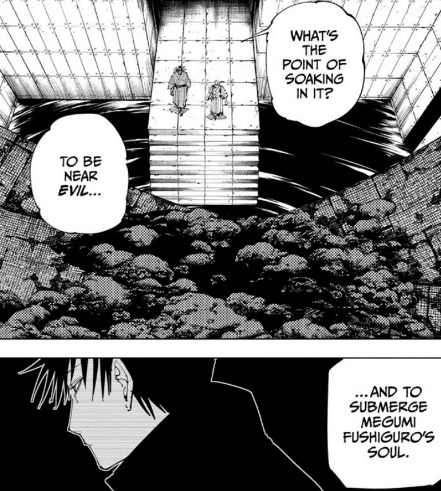
If saving Megumi is just a matter of ridding him of Sukuna's possession however, then how does that allow Megumi to reclaim his agency? What agency does a damsel in distress who just exists to be rescued have?
Megumi's entire arc has been defined by the potential power that everyone sees in him, and his inability to reach that power especailly since other characters (especially Sukuna) seek to steal that power for their own ends. In the culmination of this arc, Sukuna literally steals Megumi's body, and his bodily agency.
How does Megumi finally live up to that potential if Megumi's arc ends with him being saved by Yuji? How does this make Megumi grow or change in any way?
Sensui, who is once again Gege's model of a corruption arc is referred to as a pure angel that was inevitably grew scarred and defiled, by his close personal confidant Itsuki. Not only that, but sinking deep into despair made him grow stronger not weaker.
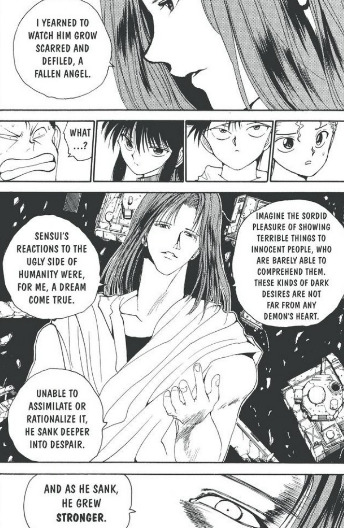
Itsuki is also, a demon who met and encountered Sensui and then took a deeply invested perosnal interest in watching Sensui be corrupted in real time.
Megumi also has a curse that took a sole interest in him because of his talent and potential, then had a hand in bringing him closer to evil in order to make him sink into despair. There's once again the symbolism of purity being corrupted.
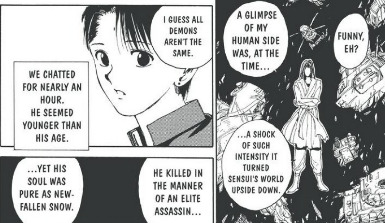
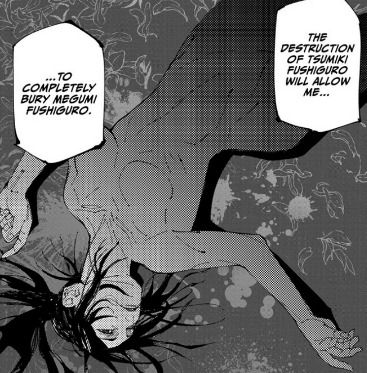
This panel explicitly shows white lilies (symbols of purity) being torn apart and blackened to symbolize what Sukuna wishes to do to Megumi in order to further is own ends.
There's also the heavy budhist symbolism with Sukuna's role in the story, and the way he influences the rest of the cast, especially Gojo Satoru who is our stand-in for the Budha. If the goal of Jujutsu Society is to attain enlightenment (escape cursed energy probably the only thing that will end the miserable lives of sorcerers), then the merger represents the opposite, Kenjaku's goal of optimizing cursed energy by mixing humans, sorcerers and curses to give birth to a new being.
That's also a conflict that needs to be resolved, but Sukuna by pushing forward the optimizing of cursed energy and representing the peak of sorcery living only for sorcerery and his own strength represents a Mara.
Sukuna is comparable to the Celestial Demon Mara in budhist mythology, more on it in this thread. In budhist cosmology, Mara is the “personification of the forces antagonistic to enlightenment.”
If the ultimate goal of budhism is to escape the cycle entirely and stop being reborn in the sensuous realm, Maara instead tempts people to stay in this realm. it defines impernanence by suggesting we stay in this realm forever. It defies Dukha by saying we indulge in physical pleasures in this realm, that we should seek to satisfy ourselves even if budhism argues that life is primarily unsatisfactory.
We even see Sukuna literally tempt a budha-like figure into remaining in this earthly realm. After all aren’t we shown that Gojo achieved enlightenment at seventeen and let go of earthly emotions like the need to be angry and avenge Riko’s killer because the feeling of oneness with existence was too good in that moment.
A lot of people noticed what they thought was Gojo acting out of character in the fight with him and Sukuna, by enjoying the fight and choosing his selfish desire to love jujutsu and fight as a sorcerer over his responsibiltiy to protect children. Something which Nanami says in his dying hallucination that Gojo only ever lived for the pursuit of his selfish desire for Jujutsu in the first place.
Gojo in his last fight against Sukuna forgets about saving Megumi or at least makes it a lesser priority, because Sukuna tempts him to do what he's always wanted to go all out in a sorcery fight and have the freedom to use his powers to the best of his ability. Hoewever, even after using his full strength, Sukuna cuts down the notion that he is above humanity and drags him back to the earth - literally calling him unenlightened.
“This is goodbye. You were born in an era without me and hailed as the strongest yet you turned out to be painfully ordinary…”
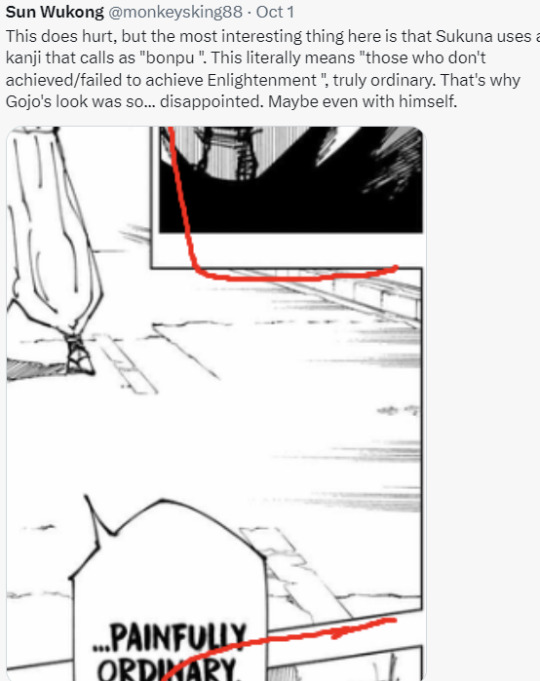
Does Sukuna not represent this temptation for all characters? Sukuna represents the selfish ideal of sorcerers, using his powers for himself to satisfy his hedonistic desires and because of this he has the most agency in the story and the story at times even bends to his desires.
Characters even fight for Sukuna's recognition, Hajime, Jogo and Gojo are validated by that same recognition in theend.
Why wouldn't Gojo and more importantly Megumi who are characters with very little agency not jump at the chance to be more like Sukuna, especially if it brings Sukuna the freedom he possesses?
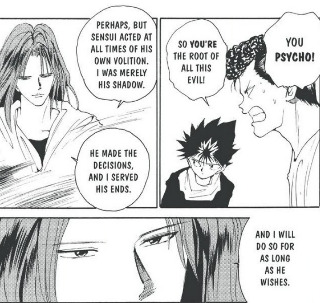
Itsuki refers to himself as Senseui's shadows, leading him to act on his darkest impulses and enjoying watching the corruption spread. Megumi is literally a character who's Jujutsu revolves around his shadow, and summoning powerful Shikigami from it in order to fight. A character with an incomplete domain expansion (another loose plot thread with Megumi that would be unresolved if Megumi were simply saved) which is his own creation, which might surpass Mahoraga the technique handed to him.
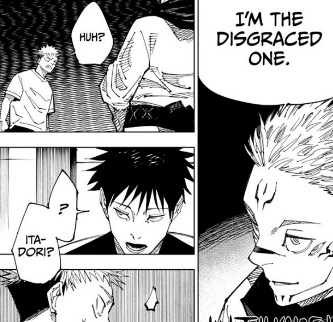
In addition to being a Mara, Sukuna is also literally called the "fallen / disgraced one". Itsuki calls Sensui a fallen agel, but in the context of Jujutsu Kaisen there's literally a character called Angel, who's only goal is to save Megumi's soul, and there is a satan figure in Sukuna who wants to corrupt him. Literally, there's an angel and devil on Megumi's shoulder.
How is stealing Megumi's body corruption though? Megumi's not being tempted into being selfish. He's not responsible for any of the sins that Sukuna commits in his body. There's no arc there, because Megumi doesn't reclaim his agency in response to having it stolen away, he doesn't decide to do the bad things himself - it's Sukuna who commits the wrongs.
Even More Setup for the End Game
Here's where I stop referencing Yu Yu Hakusho and only use foreshadowing in the comic itself. The first is the discussion of roles, and how Yuji needs to break away from them, as much as Megumi needs to fight for his agency back.
Part of the reason Sukuna jumped bodies is because Yuji wanted to be given an easy role like a character in a story - rather than thinking and deciding for himself. He thanks Megumi and Gojo for giving him a role seconds before the body swap happens. If Yuji is immediately punished for thinking that what he needs is to be a cog in the machine, to be given a role then methinks that's a bad thing.
However, Yuji has not broken away from that thinking in any significant way. Sukuna even mocks him for finally being given a role.
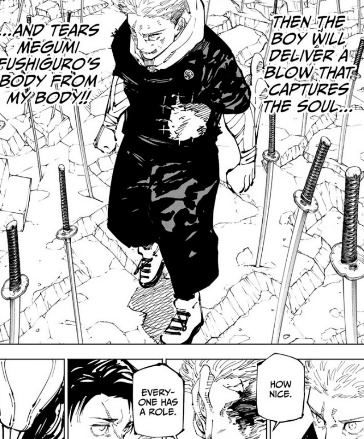
If Yuji's thinking hasn't changed then no story arc has taken place. If this conflict of Yuji wanting to conform to a cog or a role has persisted since Shibuya - then it's clearly important to his arc and is something that needs to be resolved. If Yuji just solves the problem by being stronger than Sukuna and beating him in a fight, how does that resolve Yuji's flaw of clinging to roles rather than thinking for himself? I ask once again, where's the change?
Saving Megumi like a damsel in distress is still a role someone else has assigned him.
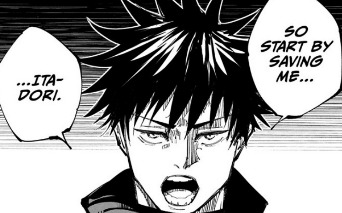
How does the decision to save Megumi right now challenge Yuji's hero complex in any way, besides the fact that Megumi has sunk into despair and would rather just end it all. Is that much a conflict that really forces Yuji to think for himself - to go against the grain of society rather than blindly following others.
If Yuji gets to rescue Megumi like a damsel, that's giving him what he wants, without forcing him to realize what he needs. That's as much of an unfullfilling end to Yuji's arc as a ending where Megumi never reclaims his agency and stands on his own feet and just has to sit there and wait and be passively saved.
Most of all the question: "Is it possible to save someone who's not prepared to be saved?" goes unanswered.
Geto wasn't just depressed and suicidal, he was actively making harmful choices and represented a danger to others. He also had no intention of stopping the path that he was on.
There's a clear parallel between Megumi and Yuji's friendship, and Geto and Gojo's past fallout. However, if it's just a conflict of Yuji saving Megumi who's simply too suicidal and doesn't want to go on living, there's no conflict there. The audience will not see whether or not Gojo was still capable of saving Geto post his burning down the village, or if there was no walking back from that choice. The previous generation won't resolve or fix the mistakes of the past generation.
Yuji remains a hero, Megumi remains a victim, as I reiterate for the thousandth time there's no change.
Megumi starting the merger, or even defeating Sukuna himself (maybe with a completed domain expansion) and then starting the merger is a change. It's also foreshadowed, Mahoraga is the technique he inherited, the technique Sukuna stole (and Mahoraga won't work against him he's already defeated it), Megumi's domain expansion is his own creation, created in his deepest moment of personal growth.
The process of individuation also literally requires a character fully integrating their shadow. Sukuna possessing Megumi is not Megumi facing his shadow or his worst traits, because Sukuna is not Megumi's shadow, he doesn't reflect Megumi's flaws in anyway, he's literally just a parasite.
There's also the 1001 Toji parallels to Megumi that have gone unfulfilled. Toji specifically a character who was abused, then chose to continue the cycle of abuse, specifically because he wanted to prove himself stronger than the peak of sorcery. Especially after a lifetime of being belittled and abused by not having the potential of his Heavenly Restriction recognized.
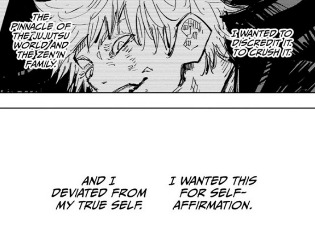
And what do we have here, but a scene of Toji LITERALLY EMERGING FROM MEGUMI'S SHADOW, in order to enter Dagon's domain.
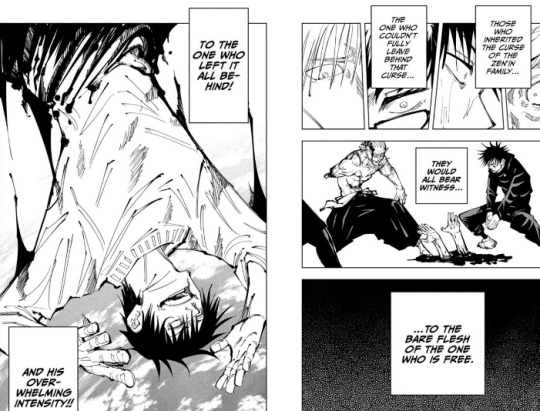
How is Toji referred to afterwards? As a puppet of carnage bearing his fangs at the strongest around.
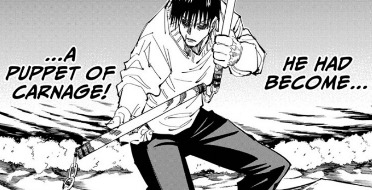
An incredibly Sukuna like description, number one because Sukuna's entire existence is simply bearing his fangs at the strongest around, and number two Sukuna is referred to as pure destruction, like a calamity, something with overhwelming sense of self and no humanity.
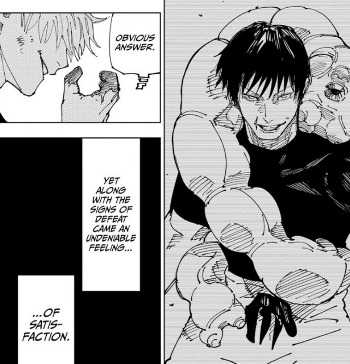
Not only that, but when fighting Sukuna, Gojo makes an explicit reference to Toji comparing him to Sukuna as the last time he ever felt nervous or challenged by an enemy. Sukuna and Toji are being alligned as similiar characters, supremely selfish people who hoard their agency and strength. Toji also represents the worst of Megumi, a victim caught in a perpetual cycle of lashing out against the world, a bad future path he might take if he doesn't get over himself.
Sukuna is connected to Toji wo is connected to Gojo, and all three represent a path that Megumi has been nudged down his entire life, that he should just selfishly use his power with no regards to anyone else the same way they do.
As I said before in my comparison to Jean, why wouldn't someone who's been robbed of all agency for so long, not go too far in reclaiming it? What's stopping them now that the chains are finally off?
Megumi parallels Geto, who parallels Toji, who parallels Sukuna and why draw all these lines between these characters if it's not to represent a path that Megumi could take?
In other words...
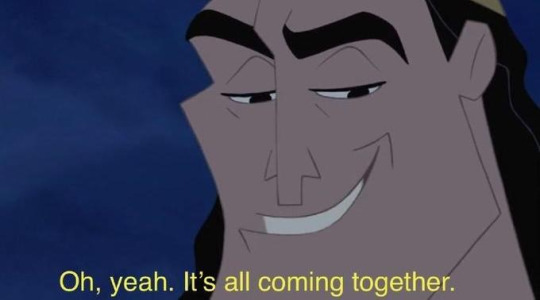
#megumi fushiguro#jjk meta#jujutsu kaisen#ryomen sukuna#geto suguru#fushiguro megumi#gojo satoru#jujutsu kaisen meta#jujutsu kaisen theory#jujutsu kaisen spoilers
242 notes
·
View notes
Text
actually im making this its own post. the thing about the hunters gonna lay low is that its exactlyyyyyy what i want out of a fantasy romance. i love high stakes and unrealistic drama - life-threatening situations and monsters and magic and all manner of situations that dont happen in real life. and i love this as a setting for romance because it means you can create a lot of conflict that doesnt have to do with the characters feelings for each other - sure, you can still have arguments and complicated feelings, but throwing the characters into these high stakes situations creates a lot of flavour - high intensity emotions and conflict that arent just from within their relationship, yknow?
the problem with most fantasy ive read that also has romance is exactly that - its fantasy, with a side of romance. theres romance, sure, and a lot of times side romances do have these high-intensity moments im looking for, but usually the author is spending more time on worldbuilding or political drama or yknow. the plot. nothing wrong with that - i like an intense action plot without romance. its why i read a lot of fantasy. but i think ive really been hurting for a story that has this kind of high-stakes drama, but makes the relationship a more central part of the story. and ive had no luck with romance with a side of fantasy, either - most romance stories ive encountered are about very typical romance-style relationship drama, even if they take place in a fantasy setting. jealousy and miscommunication and will-they-wont-they. again, nothing wrong with that, its just not really my style.
and this is why all my ships of choice are Like That. its always an action story with a pairing of major characters who have a deep relationship - they have history, they care for each other a lot, they click with each other in a way they dont with anyone else....... the kind of thing where the growth and development of their relationship is a big part of who they both are. and then putting them in high stakes scenarios where they almost die all the time. you get it. the thing is that ive never really encountered one of these where the relationship was canonically romantic - which isnt necessarily a bad thing, but again, romance can add a lot of unique flavour! its why i read a lot of slash fic lol
[the closest ive gotten to this before would be banana fish, and i love banana fish so much i basically dont have anything to say about it. what is there to say? watch banana fish.] [hmm and maybe alien stage? alien stage is just so short though - not a lot of time to get to know the characters before they die yk.] [and notice how these are both tragedies???? i love tragedy but man. i do want a happy ending sometimes...... although i havent actually finished thgll so i guess this one could be a tragedy too 😩😩 pleeeease i just want them to be happy.......]
but here it is!!! the kind of story about a duo whose lives become intertwined through the high stakes fantasy plot, who care very deeply for each other and have history and keep watching each other almost die, and also they kiss!!!! its honestly a little frightening how well it suits my tastes - i can almost see the way the author is using the fantasy setting to deliberately further the relationship between these two, because its the kind of thing i do to whatever blorbos im rotating in my brain like a binary star system this month. but because the characters were actually created with romance in mind its like. cranked up to 11. like what do you mean cha euijae is the only person who can safely touch lee sayoung????? hello????? and the soul contract???? the alternate timeline?????? the BACKSTORY?????? i dont want to spoil too much but like. it really is just so good. its exactly the kind of thing i didnt know i was looking for.
and like. not only is the fantasy setting perfectly implemented for this more relationship-focused story. its also just really interesting in its own right?? like im hooked. im absolutely invested in these two trying to stop the apocalypse, save the world, and maybe avoid dying and leaving the other behind (again) in the process. im having the time of my fucking life right now
[btw i just finished part 1 of the novel, so no spoilers please!!]
#biggie tumbles#not sure if this one will become a permanent fixture in my brain but like. its DEFINITELY one ill be revisiting more than once#the hunter wants to live quietly#the hunter's gonna lay low#thgll
28 notes
·
View notes
Text
Things that make Weirdmageddon a top-tier finale:
Every victory and ally the characters gain is essential to pursuing the next victory.
Dipper needed Wendy to reach the bubble, needed to talk down Gideon to reach Mabel, and needed to reconcile with Mabel to do anything. Then they needed to reach the Shack to get Shacktron, needed Shacktron to reach Ford, needed Ford and all their previous character development to build the Zodiac—oops! not enough character development! REVERSAL! But they still pulled out a win from having all four Pineses in the Fearamid, which wouldn't have been possible except as salvage from their previous victories.
It all builds really nicely—it's easy to get your characters running in circles to fit in enough action and/or screentime (see certain Classic Who serials), but that doesn't happen here.
Personal issues and plot problems were interwoven in a way that genuinely made resolving the former a basic step in resolving the latter.
The big problems at the start of the finale were the rift between Dipper and Mabel, the older, deeper rift between Stan and Ford, and... well, the Rift. And Bill. The finale is able to resolve all of these things together because it is, in fact, crucial that the Pineses all be able to work together; they need each other to defeat Bill. This means that, for instance, Mabel and Dipper's reconciliation is the urgent first step on every level, personal and situational (neither of them will accomplish anything until Mabel's free), and that Stan and Ford's reconciliation is a necessary condition for the last step of beating Bill. It's seamless—no one has to take time out of the plot to talk about their feelings, because the plot can only move if their feelings are being addressed.
Even more, the action works in such a way that Stan and Ford have to show character growth to defeat Bill and the way they defeat Bill then results in healing for both of them (Stan gets to be a hero while Ford gets to let go of his hero complex).
Gave time to addressing the big themes and made them structurally important, too.
This ties in to the point above, but... the fact that Dipper and Mabel's conflict (the manifestation of a much longer-running tension of "is it possible to grow up and still be happy? is it possible to be sure we'll stay in a close and healthy relationship, and not lose each other?") is given its full weight. Dipper and Mabel have the conversation they need to convince themselves, each other, and the audience that this ghost has been expelled from their futures. That's big.
And the themes continue consistently throughout the finale! They answer the questions raised by Stan and Ford's estrangement—first through Dipper and Mabel and then repeatedly through the rest of the cast—with consistent reassurance and hope for the future. It's thematically sound. That's not easy to balance with plot progression in a way that makes sense, but like. The plot can only progress to a happy ending if these themes are tested and found to be true.
Plot development and emotional impacts hinged on information the audience already had.
When the finale revealed new information (the zodiac's function, for instance), it was almost always answering specific questions the show had previously raised for fans (what's that zodiac about??). Not always true—the barrier around the town was not foreshadowed—but a very high percentage of the time.
More, the moments with a big emotional punch hinge on us realizing something at the same time as the characters and sharing their reactions to that thing, rather than reacting to their reactions. That sounds clumsy, but you know what I mean—"Grammar, Stanley." Ford pulling out the memory gun. "Get off me, Waddles!" Ford holding out the picture of the Stan O' War. The finale builds on what we already know so strongly that we can react to good or bad events alongside the characters.
(Well, except for the exact moment revealing the twin switch, I guess. We are not having the same emotional reaction as Bill Cipher there. ;P)
A fully satisfying send-off.
After the plot is resolved, and even after the eucatastrophe moment of Stan getting his memory back, we get to stick around and see for sure that everything's okay. The twins turn thirteen. Stan and Ford plan to go sailing. Soos gets the Mystery Shack. Everyone in Gravity Falls is fine. Everyone gets to say goodbye. We end on repeated reassurances that the thing the story most highlighted as crucial but uncertain will, in fact, happen—that they'll stay a family and they'll all be happy.
I'm not saying every story needs to end with a wrap party, but it was the right move for Gravity Falls, and they nailed it.
224 notes
·
View notes
Note
what do you think of the complaint tilla is nothing more than a plot device for blitzø?
I agree. I mean, she's not a character, at least not at this point in the show. Her memory and tragic demise are part of Blitz's character, and that's all. We've never seen her do or say anything- just her image in photographs and in Blitz's hallucination. Whether she gets developed in the future is yet to be seen.
But I don't think it's necessarily a problem, and if it is, it's not a show ruining one . . . Stick with me.
A lot has been made of how HB doesn't pass the Bechdel test (it does, but not very often- I'll give the critics that), and how the male characters are often featured over the female characters. And well. If what you mean is that the main character and his love interest are both male, and they're the characters who get the most development, yes. One could argue that some of the female characters (especially Millie) are getting more and more focus over time, but I think that's besides the point. Yes, male characters get more focus overall in this show.
Here's the thing though. Advocating for more woman-driven stories doesn't mean that male-driven stories existing too is problematic. Representation is important, but every piece of media doesn't have to represent every demographic and every topic. It's okay to love a piece of media where the best developed characters are dudes. It doesn't make you a misogynist; it just means you like those particular characters. Same can be said for the writers.
Do I think it's a problem that we live in a culture where it can be harder to find media that passes the Bechdel test than media that doesn't? Yes. Do I think it's a problem when a majority of female characters are flat and only plot devices for male pain or male growth (which isn't true for HB overall btw, even if it is true for Tilla)? Yes. And when it comes to discussing our culture as a whole, it's a different discussion.
HB has a ton of queer representation. It takes on difficult relationship topics and class and race issues in some very rich and interesting ways for a comedy cartoon. While the writers don't diagnose their characters, I feel represented as a neurodivergent audience member. It's an independent project made by a small company of diverse young artists who are passionate about what they're making. I would call it an overall cultural good.
By the way, I think it's a little bit weird when, while analyzing a show with a lot of interesting female characters, antis go for the character who has the least development. It's silly. The existence of a character who is a device doesn't mean anything on its own- it's just a bit of expedient writing.
#asks#my helluva meta#helluva boss#helluva boss meta#tilla#blitzo#blitz#blitzo buckzo#discourse nonsense
49 notes
·
View notes
Text
Naruto and being the Underdog
Okay so recently I was discussing naruto's characterisation in the comments section of a fanfic and the author was explaining that they don't like/never vibed with Naruto's character (which is totally fair). But then they explained how they felt the supposed underdog setup was contrived and didn't really work because Naruto never actually starts at zero thanks to his jinchuriki powers and being the yondaime's son. (And so here I am, on my soapbox to discuss how Naruto and the concept of being an underdog relate.)
On a physical level perhaps this applies, but Naruto places an equal (if not larger) amount of focus on the emotional action as it does on its plot action.
On an emotional level he has to work for each and every one of his personal relationships.
He wants to be hokage a role he can only take if he is both respected by his village and powerful enough to protect it. It''s a twofold goal. And in terms of the social aspect this is clearly stacked against him due to the hatred and exploitation of jinchuriki as well as shinobi in general, achieving emotional connection and dialogue between people who are used to might makes right or who are pre-disposed to look down on him or want to kill him puts him firmly at a disadvantage narratively.
With the notable exception of Hinata whose love is unconditional, whether it's Tsunade, Neji, Sasuke or Gaara or even Kurama the respect and attention that naruto craves are things he actively pursues in both good and bad ways and he earns them through his own effort.
He does this both by striving to understand these very different people and where they're coming from as well as surviving all the shit the world throws at him. Emotional and physical tasks.
In terms of being a jinchuriki and getting the rasengan easily thanks to his shadow clone bullshit / birthright connections to the yondaime It must first be acknowledged that the jinchuriki power is more of a disadvantage than a boon to him at first. First, because of kurama actively going out of his way to mess with his chakra control as a kid while doing the leaf exercise he was unable to learn the regular clone jutsu; it also results in him experiencing the trauma of discrimination and isolation from a young age which could easily have led to festering self-hatred and alienation if not for Iruka's intervention, it results in multiple S ranks who are fully capable of killing even shippuden level Naruto targetting him, and while the trade-off of boundless energy and survive-ability is immense those same boundless resources have the potential to burn him alive if he loses emotional control/gives into his most negative emotions - that's basically making the subtext text at that point, the story is about his emotional development and growth, something his "OP buffs" don't earn for him. Let's talk about boundless chakra resources for a moment. At the end of the original series, he only knows the rasengan; the rasenshuriken, the shadow clone justu and sage mode/yinyang mode by the end of the series and that's like 5 justu tops if we're counting yin/yang/bijuu mode and sage mode as jutsu. The majority of what he learned from jiraiya for three years seemed to be taijutsu only with a side of failed bijuu control. Naruto has his jinchuriki chakra from the start but that doesn't translate to an ability to use it, he has to spend hours working out how to do the shadow clone, he did not figure out how to do the jutsu because of his chakra even if that was the reason he was able to use it at all, and when it comes to the rasengan I will cite [someone who deleted their reddit account] here:
Naruto completed the first stage in three days and one night. He figured out how his chakra needed to move to burst the water balloon (thanks to a cat) but because he didn't have the necessary chakra control, he improvised by using another hand. He completed the second stage in three weeks or so. The next day(?), Jiraiya gave him a hint to improve his focus which allowed him to finally complete it. And the third stage was completed seven days later to win his bet with Tsunade. Once again, Naruto didn't have the control to focus his chakra the correct way despite his continuous efforts. It wasn't until he came up with another improvised method by using a shadow clone to focus the chakra that he was able to complete the final stage.
Meaning he is the one who comes up with unorthodox methods, such as also using his other hand, or using a shadow clone to focus the chakra, to learn it in four and a half weeks but he still had to figure out how to do it all himself. The shadow clone would've been useless without his understanding of the jutsu or his ability to do the individual parts of the jutsu. He earns the jutsu and could conceivably have learned it the old fashioned way were he not under an artificial time limit as both Jiraiya and Kakashi, both without jinchuriki power, know it and can use it.
Now I'll talk about his supposed privilege as the yondaime's child: Sasuke gets chidori and later kirin thanks to HIS connections but that's never remarked on in the same way. And in fact most people in the naruto-verse learn a big jutsu from their clan or parent; see Might Gai, the genius of hard work, learning the eight gates thanks to his father. The rasenshuriken is something he's only capable of learning thanks to his chakra and shadow clones I hear you quote Kakashi, but it's again, something he couldn't do without actually putting the work in to learn the jutsu. Naruto is on a time crunch because of Akatsuki, the fact he is capable of learning the jutsu once he has advice on wind chakra from Asuma and has practiced forming the rasengan and doing windblades enough means he didn't need the extra chakra to do it, having the chakra didn't automatically make him capable of the rasenshuriken all it did was speed up his chakra control practice exponentially, it would have taken him more time practicing but he could have learned the jutsu eventually even if he wasn't a jinchuriki. Now summons. Being the Yondaime's child might get him an in with Jiraiya to let him have the toad contract, but Sakura and Sasuke also get summoning contracts thanks to personal connections with Tsunade and Orochimaru and Jiraiya only gets him the opportunity. It's Naruto who has to use his willpower to stay on Gamabunta's back and it's Naruto who has to form relationships with his summons like Gamakichi, (a bond that becomes instrumental toward the end of the 4th war). Additionally learning Sage mode wasn't just a result of Naruto getting the contract because neither Sasuke nor Sakura achieved it despite both having contracts (and despite Kabuto managing it where Sasuke didn't) Sasuke with the Hawks as well as the Snakes. And importantly Naruto was unable to use clones or his extra chakra to speed up his training in this. In fact the clones only come into it after he has successfully mastered sage mode and function as a limited extra resource that's can't go beyond three shadow clones meditating and this doesn't function as more sage powah but as a means of extending his sage modes duration, a workaround that's only needed because his being a jinchuriki gets in the way of him gathering sage mode in real-time with the toads on him. In conclusion while his chakra lets him practice jutsu to learn them faster, this is not the case in either his sage mode or the yin yang release and only applies to the shadow clone, rasengan and rasenshuriken - all of which he had to actually learn and understand the mechanics of otherwise the jutsu wouldn't have worked no matter how many shadow clones he had try it and that with the exception of shadow clone he demonstrably could've learned them without being a jinchuriki. And in the case of rasengan and rasenshuriken he is under artificial time-limits imposed by Orochimaru and the Akatsuki.
So that's shadow clone, rasengan, rasenshuriken and sage mode covered but what about bijuu mode. An overpowered special mode he only gets for being a jinchuriki, that B only bothers to teach him because he's a jinchuriki, surely that's LEGIT op bullshit. No? No. At least not in comparison to the Sakura's forehead seal from Tsunade, Sasuke's Mangekyou abilities like izanagi, giant purple warrior and amaterasu, Obito's mokuton, Madara's sage of six paths abilities or the rinnegan's everything, anyway. Not to mention what the edo tensei are capable of.
The only reason bijuu mode works is that he earns Kurama's regard on an emotional level, it's not something which being a kage's kid or having jinchuriki chakra levels actually does fuck all to contribute to. He was that all along but Kurama still hated him and tried to take over his body. It's Naruto himself who has to reach out and make that effort to understand this person who he's always seen as a burden or a curse or an annoying tenant who doesn't pay rent, a monster who tries to kill him and take his body. It's Naruto who has to put in the emotional labour and see Kurama as a person, no matter the harm he's done.
Naruto is the underdog in spite of being "the chosen one" and having the strongest bijuu and a kage father because emotional labour is never easy and in a world like his it seems insane to even try. It's why everyone except him was prepared to give up on Sasuke, Naruto recognises his anger at Itachi and desire to avenge his family as valid, Naruto when he finds out the truth about Itachi from Danzo tells Sasuke he gets it, why he wants to destroy the village, why he's so angry, when Sasuke changes his mind and decides to become hokage instead of destroying it so he can change it, Naruto understands WHY even if he still wants to be kage himself. The problem with Sasuke is that his anger is self-destructive and self-isolating, not that it exists, it's when Naruto fights him one last time and makes Sasuke realise that he's only hurting himself and his loved ones at this point, that "talk no jutsu" finally works and Sasuke is able to listen to Naruto and come home.
It's also why Naruto earns being hokage; in a world full of killers, someone who is capable of acknowledging the harm done and not ignoring or forgetting it (like how he tells pain he can't forgive him), but who is also capable of looking past that and understanding the motivations and feelings of the person he's dealing with and talking to them on that level as equals hits so hard. It just felt like a fantastic set up for a diplomatic hokage capable of dealing with other kages and achieving a peace in spite of the fact they're all to the last, untrustworthy ninja mercenaries who are generally very ends justify the means. In a world of kill or be killed Naruto is still willing to kill, but he's also willing to understand and to talk. And he wasn't born with that, he worked for it and failed often, especially with Sasuke, it was never easy, it often appeared hopeless but he kept trying.
And we rooted for him because of it.
#naruto#naruto meta#meta#naruto is the underdog stfu#read critically damn it#naruto shippuden#naruto analysis#uzumaki naruto#sasuke uchiha#kyubi#kyuubi#kurama#sage mode#yin/yang release#rasenshuriken#rasengan#overpowered naruto#underdog naruto#shadow clone jutsu
145 notes
·
View notes
Note
When you get the chance to read Dramione fanfiction, do you have a preference for Draco's or Hermione's perspective? Or do you enjoy reading both?
And, I don't know if you've answered this before, but what made you want to write a story in Draco's perspective? I know you've mentioned relating to Hermione's character on a personal level - did you feel too close to her to write from her point of view?
I don't have a preference as a reader! I love fics from both perspectives. I do feel like I'm more prone to "he would not fucking say that" syndrome when it's Draco, which is definitely some sort of personal neurosis, because based on the availability of canonical characterization I should frankly be way more picky about Hermione than Draco. I think this is related to my having spent so much time in his head for my own fic: I've developed a bunch of really strong internal heuristics about How Draco Behaves. It'll probably take me a while after I've finished Lionheart to reset all those rules and go back to being chill about him again.
The idea for a Gryffindor Draco story dropped into my head on its own, and once I had thought of it, I knew it had to be Draco's POV. So much of the plot depends on the reader understanding why Draco is making a given decision at any given moment, and a ton of his growth takes place internally; if it was from Hermione's POV, you'd miss tons of stuff about, e.g., his mom, Snape, his relationships with the Slytherins, and his reflections on his father. More to the point, Lionheart is essentially Draco's story; the change to canon, and the consequent arguments that it makes about how and why canon goes the way it does, is based on a shift in what happens to Draco. You could fairly describe it as "a bogglingly exhaustive exegesis of Draco Malfoy's consciousness," which is the kind of thing that only works if I can show you what I think he's thinking.
23 notes
·
View notes
Text
Clear to see, The Gaslight District is what the Haz/Boss could be
This may sound harsh but it's apparent that The Gaslight District in it's pilot alone managed to do what both Hazbin and Helluva started but steadily phased out.
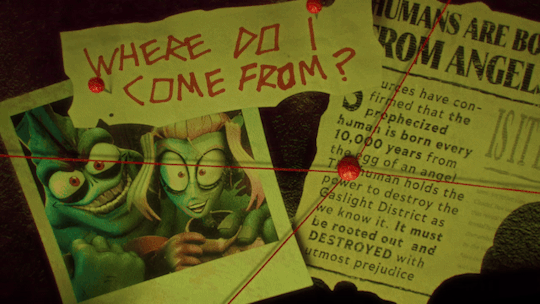
That would be making the plot it offered us the most important thing, having dynamics between the leads and introducing real risks factors all while being that crazy black comedy.
I am happy to cut pilots some slack but good for TGLD to manage in a 20 minute pilot more for its story and characters than two pilots, three seasons, a focused back to basics spinoff of a spinoff, MV's and insider information from patreon and other online engagements.
Similarities
Between these three shows, comparison is no doubt inevitable since both have clearly taken from Judeo-Christian scripture and literature to offer a chaotic, godless hell setting with a mysterious hierarchy and further mysteries in heaven.
We get a ragtag bunch in the spotlight running a business for the people in all three with a lead character desperate to have their idea work as the opening to their story, all businesses have former humans who have everlasting life as their clientele.
Between HH and TGLD we have a youthful and optimistic female lead who could change the world and between HB and TGLD we have a hardworking adoptive dad running a business and leading the group into trouble they're best not questioning.
Plot, growth and pacing
Blitzø runs an assassination business where he takes commission from dead humans to slays those on earth. There's no proof of this being a passion project but something he does for the money, he has no view on humans and no concerns about those who will end up in hell. Whether he's desperate for money because he's struggling, greedy, aims for a greater comfort, sees this as easy money, has had bad experiences in work or just knows he doesn't work well under others is all unclear. We just know he's a commoner who had it tough and it's guesswork from there.
Helluva boss may have been made just for fun but the drama of seeing Blitzø have to to risk his safety and dignity to enter into the transactionship to make everything work for the team, his desperation to build connections crossing over to intrusive and spoiling of his adopted adult daughter created an understandable and well rounded lead character warts and all
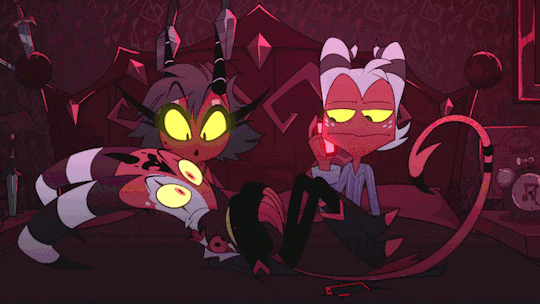
but season two as good as wiped all this by hamming up petty drama for the most random of characters in the name of fanservice, because can we really call abruptly erasing a load of established struggles and any potential risks character development? That 'just for fun' element of assassins taking on jobs no matter how petty didn't just get shelved, it got recycled to be the main premise of the back to basics shorts series, only this silently scratch out the personal sacrifice element of Blitzø's transactionship with Stolas, Stolad being the one person who could destroy the business with ease.
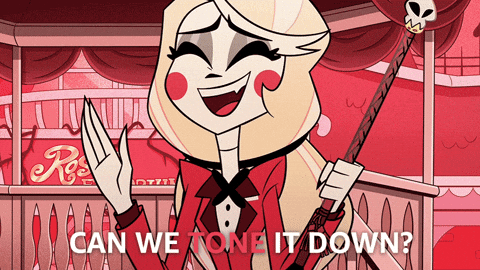
Charlie wants to deal with the issue of the purge of demons that was later specifically applied to sinners, a.k.a former humans. They are slated indiscriminately by angels to maintain numbers, but Charlie believes she has a solution to this which is to rehabilitate them in her grande and make them good enough for heaven.
Charlie knows nothing of heaven and appears to be a protected class in hell where she is perfectly comfortable. She doesn't seem in any hurry to see results and mingles very little with these people who she calls 'her people', there's no proof that she is a peoples person or hospitable in any way which is ironic if you take the shows title. We are to take her lack of wrong doing and friendliness as proof that she is a nice person trying her best but really she just doesn't get enough time and what she does get isn't memorable or important.
Hazbin had a song in the pilot then the storybook in episode one to establish lore, both seem to clash, it went from Charlie being a well meaning princess making a choice to do a charitable thing but roadblocks had her second guessing if it was best to just go home to her parents, the retcon had her being a chosen one following on from her parents who are now yet another mystery in this story of loose ends, but ultimately it made no difference because the premise of rehabilitating guests has yet to happen, we even eventually learn that even if those in the right places wanted to help Charlie they couldn't since they have no power or idea how things really work, so this only slowed is down further. Charlie has other options since her dad is Lucifer himself who created hell and still has access to heaven but she asks no questions, she's not interested, if she was an absolute moron or arrogant we may have a good character but she's neither, she's just there occasionally. On the casual we should be able to see what Charlie gets up to, how being privileged benefits her and realistically running a hotel, even a quiet one shouldn't be an easy feat.
Gaslight has a local rough neck family running a business and dealing with anybody who bothers them it will seem, this world is a chaotic one where anything goes, though their reasons may be more noble than most, but this is a secret between lead Melencholy 'Mel' and her dad whose ways nobody questions.
There is no escaping that Melancholy is a lead character we can't escape from, not the big secret she hides nor the trouble she brings, even when she's not doing a lot. What's best is her motive it to hang out more with her family,that's it. If she wants to know more about her origin which the intro suggests, again, that's will only embed us further into the story.
Gaslight also introduced us it the lore in narration before getting straight to the serious side of the main story while letting us get to know the lead characters at the same time, they have their fun and they're not nice, though they have their reasons. It ends as if it were the last episode of the season or we just watched a short film, with a cliffhanger following a perilous scheme gone wrong it presents many outcomes for the future, such as how they will get out of the mess they found themselves in?
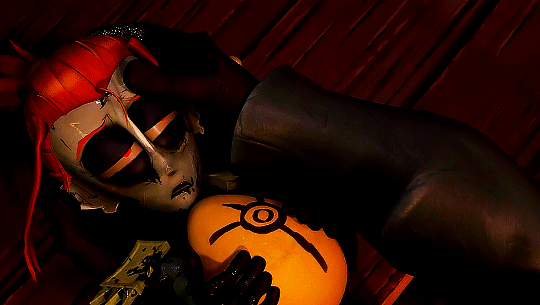
We get real angst and heartwarming moments that all easily interlink because the main characters actually have chemistry and Mel can't be rendered irrelevant. Stakes are high here but it also grounds itself well, the simple backdrop of 'local crime family' is nothing but the truth, we open with them having fun as they do 'criminal' stuff, but we also see that anything goes in this world of undead and loving it 'rotlings' who don't die, so 'family' is the key word and it just so happens that the focus is on that, we learn who they to one another as we see their dynamics naturally play out, we see what makes them stand out, with Mel by intention being the main stand out because even if she wasn't the troublemaker of this rotten family she has a secret spoiler alert feel free to dip out here she isn't like everyone else she a living human, a chosen one of prophecies whose existence is said to threaten the world the undead enjoy and her dad, family patriarch 'Ken the butcher' will do anything to ensure her safety and in the grand scheme of things, ironically, world peace.
Characters
Gaslight maintains a focus on how leading character, the well loved Mel, just isn't for this world and it's not because she doesn't like it, it's just that she's different. On the inside however she's just like everyone else.
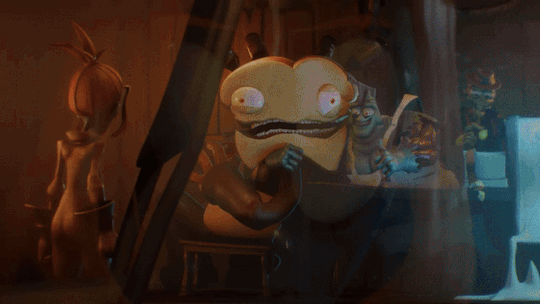
Everything simmers down to Mel, her interactions, plans and necessary oppression. Mel's feelings of loneliness, boredom and inequality along with her high energy and risky ideas can provide many possible scenarios, from wacky plans she cooked up like the angel egg heist, to accidental acts of foolishness like gossipin, the fallout she incurs can be tragic but as problematic as Mel is she's actually no more reckless than anyone else and her motive of hanging out with her family more wouldn't be an issue if she was anyone else, it would be rather sweet. Mel is a product of her environment and would be nothing special if she wasn't so physically different, her frustration is she justified and it almost seems cruel to call her selfish as she endangers those around her for the sake of inclusion, even though she's smug about doing harm, this is a hell were immortal people enjoy maiming each other for hell of it.
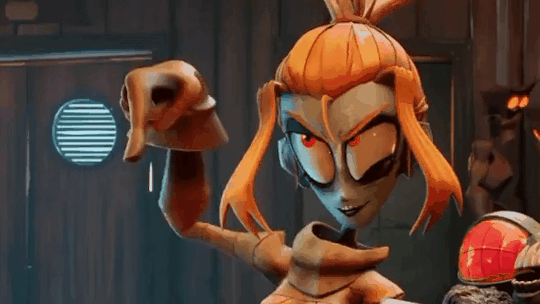
We have a lead who is modest and happy with her life, loves her family and technically wants contribute more, pity that standing out could easily cost her her life and maybe cause the apocalypse. Mel is a smart and a spirited handful seeking inclusion and validation where true equality is pretty much impossible.
One thing is like is that so far Mel being a woman is just fine, it would make no difference if she wasn't because we saw that kindness and affection between males is fine, she isn't being swaddled because of her sex and so far we see no ship.
Ken (the butcher) is volatile but social.

He is a loving and affectionate dad to not one but two main characters, it's rather impressive that he manages to emotionally meet both of them, having to constantly act quickly to keep with Mel but still manage time to let Breadhead know he's appreciated. Ken runs a resturant and bar and is a welcoming person, he employs staff who became the "buddies" of Mel, he knows their names and there are photographs on the wall so it's safe to assume they had good relationships, but nobody comes before his careless daughter's secret so he's had to violently cut ties with others in an instant.
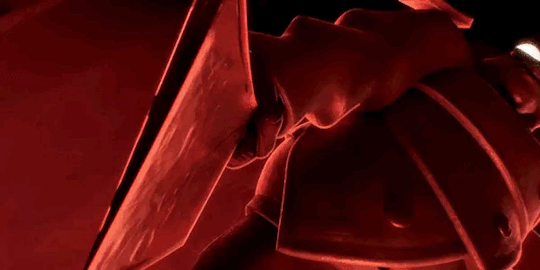
His rash behaviour is understandable, being in constant state of stress, an authoritarian leader, not being able to trust anyone, upholding dishonesy, caring for such a high maintenance daughter, along with a clear brain injury and thousands of years of experiences and history with those who hold some power.
We have Mud who is so clearly money motivated, something we see even before he shown to swallow the content of Jack's wallet and sneak in the cash register while Ken tries reasoning with Mel (clearly something he spends a lot of time doing).
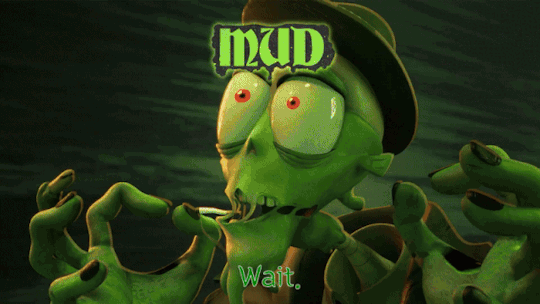
He appears to be in the dark about Mel's secret so he isn't let in properly on her plan to sneak into heaven and snatch the prophecied human egg, which was also a lie which clearly frightened him to begin with but quickly became something he was happy to try and pull off, which showed us that he is opportunistic yet loyal, yet just like the rest of society in being comfortable with eternal life, blink and you miss it but the credits even showed us that he was as upset as the crowd during the cliffhanger and we get a clue that he may have to go behind their backs for answers
Other than that he's like a fun uncle who (remember he's in the dark about Mel) believes Ken is too overprotective, offers to pay Mel to be his sidekick and gives technically fair and accurate but unwanted parenting advice to Ken about how keeping Mel bored will have her coming up with things to do.
Breadhead is the big bruiser type but apparently doesn't have a much of background, reason being he is a gollum who it seems Ken made one day and raised as a child so his whole life has seemingly been what we see.
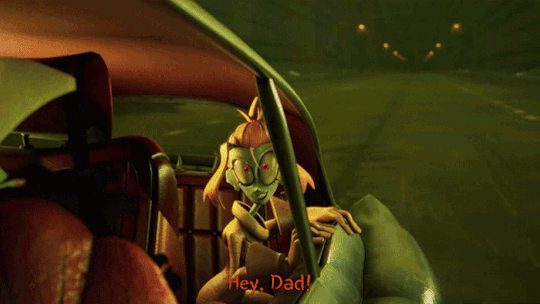
Next to his sister Mel he is the easy child, quiet, content, happy with praise and exceptionally obedient, he follows orders without question and waits on the next instruction, though Ken is clearly the apple of his eye he did take instruction from all three other leads, everything he does is for his beloved family.
Dispite sluggish speach and part if the family apparently being his purpose he is far from stupid, on the contray definitely smart since he often looks nervous at where thimgs are going and all his actions and interruptions were productive in moving the conversation to what was important, neutralizing tension or nipping something in the bud, right at the start when Mud asked Ken the awkward question of why they were hunting Jack he reminded Mud that they get paid, this was the first indicator that Mud was money motivated and could be manipulated by this, we soon found out that Ken didn't even pay his children. Another instance had him able to instantly decode and react to Mel's pig Latin while also playing the piano whilst apparently drunk, then be the first to support Mel's idea just simplified. It seems as though he may know Mel's secret but is keeping this knowing a secret too and honestly, why would such a thing come up in a conversation anyway?
The fleshing out of TGLD characters in such a short period of time really seals it in place that hazbin haz the issue of taking on too much too soon and helluva too much overtime with most things being small and not well interconnecting with what's next and what was before. Both make the mistake of letting the main character, their goal, hard work and personality get swept away because they don't fit in with all else added, in Blitzø's case it's because his story clashes with the changes to Stolas's character and in Charlie's it seems there's just not enough time for her and nobody else shares in her interest.
Blitzø has as good as been replaced as main character.
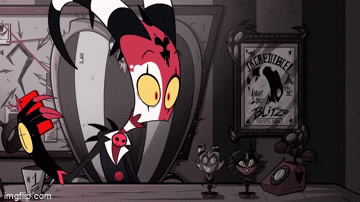
His uncomfortable arrangement to keep his business going which worked in season one where he knew full well he was being fetished by a predator who was not only creepy but clearly someone who would never respect him is no more, because the shoe is now on the other foot somehow and preditory power playing Stolas is now a victim but where it should be possible for him to be both, no, he's an all around victum even a victim of Blitzø of all people and since multiple things can't be true at once Blitzø took a hit to his character, his pushy, crass and inappropriate ways that appealed to his sugar daddy have to go as he has to prove himself, a murderer, decent, in hell, this is his development? Building bridges with those he hurt in the past but not really, like giving Fizz a 'sorry but' as they made up very easily after being in the same place at the same time, feebly approaching Barbie as she got a pointless two minutes in a busy episode and giving a hamper to a sinner he had killed dispite not regretting, this instance did connect to a wider plot however, the newest leading plot of desperation to impress Stolas who appeared to be losing interest, which would be fair enough because of the risk of losing out on rights to the grimore? But no. That major risk was discarded. Blitzø's upset at rejection coming into play? This would be totally consistent with what we have seen of him, but no not quiet. Stolas's blossoming crush from a fetish fueled hookup he started conplexing life and it's all his playthings fault? Yep, that's it. The lead role changes, and after a while of Blitzø being dismissed and ignored by those who are supposed to care about him in regards to his situationship, Blitzø is now the bad guy with power because big personality equals power. The other leads don't ship Stolas x Blitzø because they're desparate to stay in work and Fizz doesn't ship them out of projection, no, this would make them all selfish and reinforce power dynamics and Blitzø's record of poor connections, no, they simply take Stolas's, prince and stranger's side because they know Blitzø to be overbearing. Marginalised commoner Blitzø who was risking it all earn a living is now a humbled shell of what he once was and heiracy that was established is now forgetten.
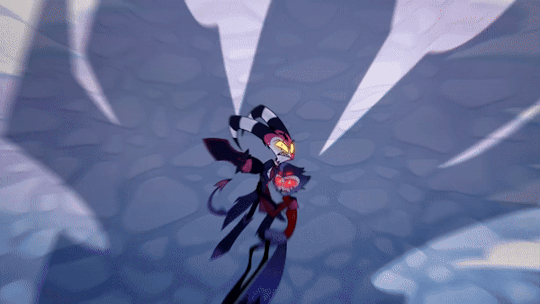
Outside of the ship, alternate means of travel to earth to carry on business are in place because losing the grimore is no issue, yet no story has come of him now being under formal jurisdiction of godlike Ozzie, another character neutered to be 'nice' but what happened to Blitzø's poor leadership and running of his business? Time passing would mean salaries and expenses mount up, but the effort and pitfalls of running a business are like that of hazbin, a fart in the wind.
We got a reminder of thr importance of being paid to work time told to him by Millie in a friendly passing remark probably made to give her the time of day because it easily would have been Moxxie bringing up such a thing of it wasn't for him being watered down to uplift his wife.
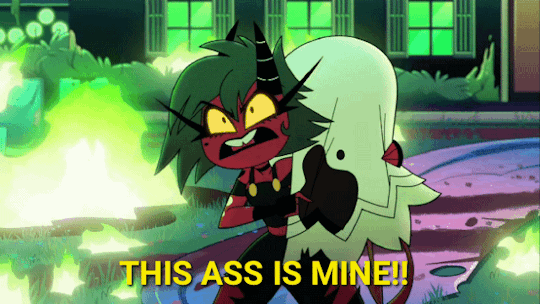
Millie and Moxxie are now pretty much the same character, take what was said above as one example, which is a shame because they were good in season one as two opposites who compliment each other, cross into codepdency but are still in the honeymoon phase.
We had the farm gal who is used to having nosey family around, she didn't hide them unlike Moxxie, so Millie not minding Blitzø's intrusion sort of worked but on the contrast she loved being exclusively seen by her more city, theatre kid partner Moxxie who loves doting on her. Moxxie clearly lacked confidence but would speak up and believed in his ideas which were for the betterment of the business, he had viewpoints that tie in with his concealed past like not wanting to assassinate the mother of the young nuclear murder family, he questioned and stood up to reckless boss Blitzø at any turn was seen as a nag and butt of the jokes, he puts up with mistreatment at work because it was always clear that things working out meant a lot to him too.
Millie enjoying and encouraging affection and gave Moxxie space to not be shy, which was good for his character, he embraced his artistry and continued to speaking up, very relevant since they'e in a small business together where Millie was the happy bruiser, but fast forward to season two and she's maybe only the bruiser because that's all someone like her is good for she gloomily let us know in a season two backstory even though rough housing is fun in her culture?
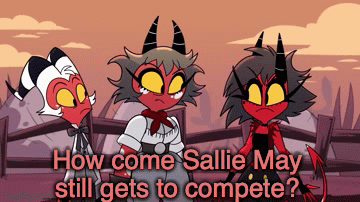
Millie's background came before everyone elses, and nothing. It became a Moxxie episode where she did nothing to defend him to her family and even discouraged his attempts to impress, she also didn't defend her job or city life in any way while coming across very comfortable, the only bit of character and conflicting viewpoints we got was the introduction of Loona as Blitzø's hellhound and Blitzø's and Loona's reactions to this, which not only got no reaction from Millie's parents who liked Blitzø and that's that but never made any difference to IMP's dynamic. I actually only remember that Loona was in this episode because of this one line, same episode we meet Striker who actually carried a relevant plot of trying to topple authority by assassinating Stolas at the town games, back then it mattered that Stolas faced threat from being g out in publc. Moxxie eventually get an excuse to gives Millie's parents a telling off in oneupmanship that Millie predictably has no reaction to. Her well adjusted family didn't matter. Moxxie on the other hand doesn't have a stable family, but when we finally meet his dad Crimson and learn Moxxie's big secret of being from a mob family, nobody checked in on Moxxie, also nobody is concerned about getting involved with someone like Crimson, gangster above all the other troublemakers in this world were they can die exist but don't matter.
Millie and Loona rescuing Moxxie and Blitzø was a great display of teamwork though what was the takeaway other than finding out Millie is five years older than Loona, it did nothing for them, on the contrary it this ep further solidified Moxxie and Blitzø's fun and heartfelt buddy cop dynamic. Fast forward to season two and Blitzø and Moxxie's connection is absent, we now have Millie being Blitzø's bff and cheerleader with her other bff being her rude sister who can hang out at her marital home as Moxxie silently slips by unnoticed, because Millie having more character ment that she Moxxie needed less, she could have content that wouldn't be out of character for him taking up screen time that could have been spent addressing her past and what she drifted away from.
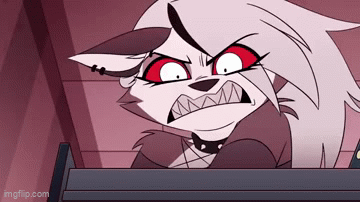
Loona has grown up a lot, she is now friendly with Blitzø and in the latest episode actually wanted to go out on a job rather than sit in her phone not manning the desk, but it would have been good to actually see her making these new friends who she invited around to hang out with and see what it is she looks at on her phone while killing time scrolling, season one let up know she was friendless when she showed us how socially awkward she could be when infront of a guy she fancied, she didn't appear to make a good first impression on anyone at that one house party she attended, so why skip what's crucial part of us watching her grow? Emberlynne from the shorts can hardly be called a side character, she got a few minutes but we atleast saw where she got her ideas and basic witchcraft from, why not Loona?
There's a recurring theme of females being there to be seen a d not heard. If they're not quietly stood in the background they have a second option of propping someone else up, otherwise they're an irritant.
Charlie's hotel manages to be a pipe dream and afterthought even though she owns it. Nobody else cares, she has no drive and somehow nobody in hell wants better for themselves, be it a stay in that big hotel or an upgrade to heaven. In this universe the people of hell can actually die. This is set in the modern day so there's no doubt countless who just found themselves there and could do with kindness and accommodation, but somehow the hotel is centre of inactivity. The hotel feels aa equal as a character as its owner, both hollow figures we glimpse at sometimes.
Charlie's status means nothing. Where the pilot offered the impression that she was a laughing stock to the public because she's a clueless princess trying to hang, the main series gives the impression that pretty much nobody even knows who she is, helped by her having as little presenceas her and seeming like her little brother, it's so obvious that they're irrelevant to make them seem more humble and not powerful.
Vaggie may have been retconned to have been a secret angel all along rather than a sinner, or did we assume? Who care because Vaggie certainly doesn't, about the sinners, the angels or her own background, she's also a bruiser spouse.
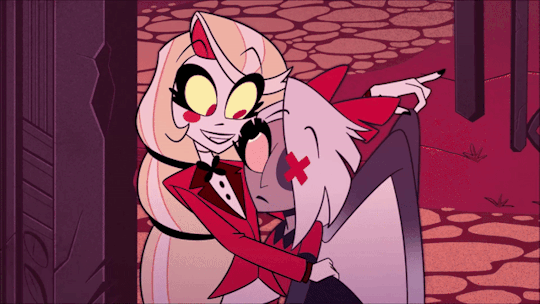
Angeldust requires a song video and the pilot that may have been scraped as part of the story to get to know more about him because they did more for him than all his content in the show. For someone we are told is popular his character he depends on someone shining spotlight on him, he's Charlie's project but we hardly see her, she hardly interacts with him and does she hope to mentor him? How? Angel being an entitled user is consistent, it would fit to have him enjoying being the guest of honor at the hotel and sabotaging Charlie's attempts to reform him in order to stay, this way both get relevant content.
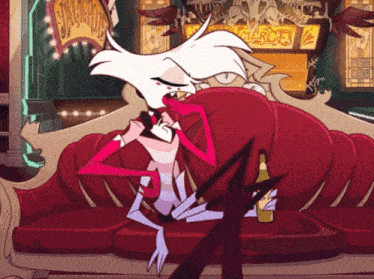
Extra and predatory boss Valentino sets him to work and we get to see him have more of a life than most other characters on the show. Angel sexually harrasses Husk but Husk is in the wrong for being upset about it and Cherrybomb is supposedly his friend but follow just the main show and tell me that this is clear.
Truly not a lot to say about this bunch.
Relevance
Hazbin's princess Charlie planning to to help sinners in her hotel seems like a passion of hers but only for a minute, she has no help and she is wide open to being taken advantage of but she too dense to care and doesn't needs to be there, the hotel could vanish and I doubt she would say a thing. Had Charlie come across more of a clueless or righteous rich girl who mixed more with the unfortunate group she wished to help then she would have plenty of content.
Hazbin Hotel has managed to not start its plot at all. How have we not had a good look around the hotel? How has Charlie gotten away with never running a whole giant hotel? Hotels have staff and guests, where is everyone and what are those around even doing? Why haven't we been able to see Charlie's plans before she goes on to fail to execute them? The pilot could get away with all of the above because like it's spinoff it come across as just starting out with some worldbuild and letting us know how they live, but pilot Charlie atleast had sense to see that maybe this was a pipe dream that she could give up on and go home to her supportive parents who were on the other end of the phone , but fast forward to the main series that depends on the pilot dispite apparent retcons and her caution is gone, along with her presence and support, the hotel isn't impotant among any of the hoard of new little stories, the purge isn't on anyones mind and the addition one was over as soon as it was announced.
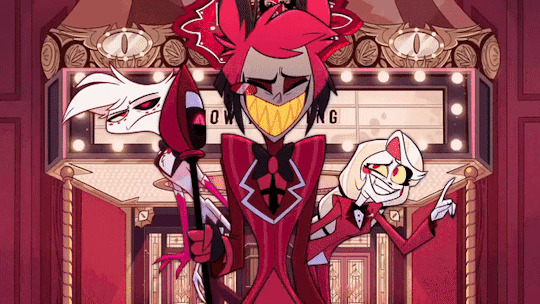
Helluva's commoner Blitzø running a assassination business from a city office just seems like something to do, he doesn't come across as interested in murder, humans, sinners or earth, his workforce don't seem to care for what they do, Moxxie cared for the running of the business but he became less visable and Millie who seemed to enjoy going out and flexing apparently sees violence as the only thing she's good for we don't see the affects of them being at the bottom of society.
Helluva boss pilot did good at letting us know that they were just starting out and that Blitzø who isn't good at making decisions had to and has to make great sacrifices to keep the business running, Loona is his nepo baby who doesn't care to be there, Millie and Moxxie are employees with Moxxie being frustrated at being the most serious one there and Millie by his side, just there but atleast she was the well adjusted one. Immediately we see them at work as assassins and we see how much that sacrifice Blitzø has to make looms over him, yet this setup has fizzled, season two and its character development has become a whole digression where sulking rules and the plot is now the main theme of the shorts series, these shorts are a spinoff series of Helluva, which is itself a spinoff series of Hazbin Hotel.
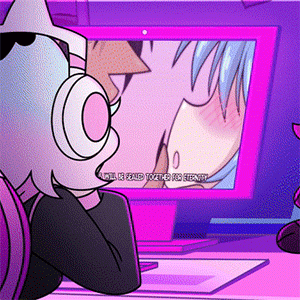
Gaslight's Ken running a restaurant is a premise that isn't that big of a deal but at the same time it may be an effort to keep it running because of reputation and staffing issues, who knows what the future holds? Being the head of a 'local crime family' is an inevitability because they're family and as foul as the next person. Do they take requests? Who knows, probably, it would just be some order amongst all the chaos. The show begins with the group setting off on a job carrying out a 'hit', but it's actually not really a job but a cover up that only half the team are in on, still our lead character Melancholy 'Mel' never joins her family on these jobs but does today so her excitement is understandable the dialogue that tells us why they're doing this 'job' and why Mel doesn't belong there fit.
Are they struggling to survive? For the most part no, they're immoral aside from Mel yet the whole story revolves around her vulnerable. This hell seems to totally lawless and they're thieves aswell as murderers, the main source of food is common fly and what makes someone higher in the pecking order is a mystery but not a loose end, for all we know the virtues, who seem to be those in power are more fragile than the general public?
Is Mel marginalised? Yes, truly so aswell as ironically top of the hierarchy but what good is it when it doesn't grant her useful powers like the basic ability to survive anything?
Is she out of touch with every one else? Ironically no and that's the issue.
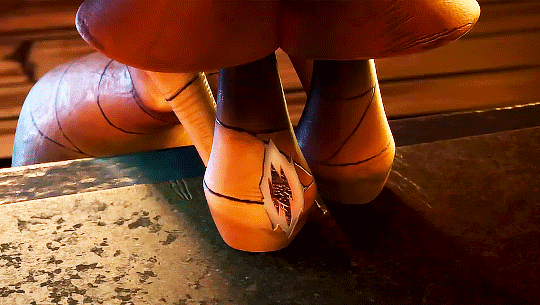
Godlike but oppressed
All three shows have those who sit at the top and those at the bottom, but where the Helluverse could be showing us both sides as we get a discarded class as one lead and a princess as another, reliance is instead on the viewer routing for whatever an authors pet says, does and wants and thing is, this formula works for quite literally everything out there. There are so many shows and movies where we follow the villain and so many casual viewing sitcoms where the lead characters are actually jerks, but does this stop us from enjoying the? Hardly, it certainly doesn't bother the fans.
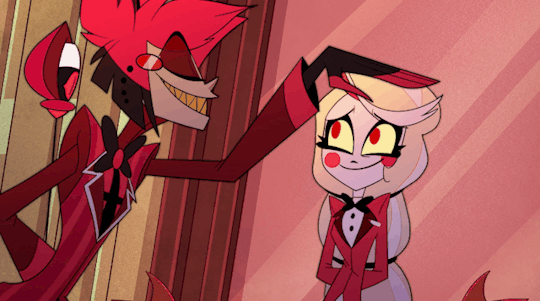
HH has Charlie offer a vague plan but barely, she sulked when daddy didn't let her have her own way immediately and clearly get things handed to her (like the hotel), we see that she is well heard when she speaks up she does she only makes requests and asks no questions, but she isn't a brat, why? Because she doesn't do much to challenge others unwillingness to work with her, doesnt seem smart and is 'nice'? These aren't good shortcuts to telling us that she isnt privileged and has it tough.
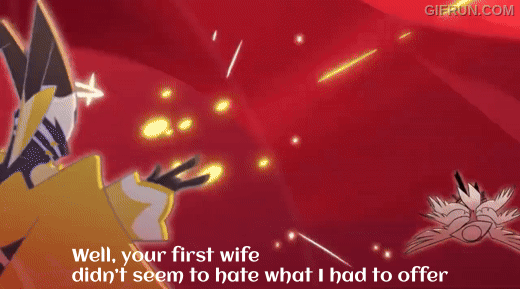
HH also gives us Lucifer who we are to believe is depressed because he says so. He is somehow the leader and creator of hell but has as much presence as his daughter and somehow even less work ethic and zero responsibilities, but he's depressed and that's that.
HB has Stolas share the exact same backstory as his mean wife who has made the best of her situation but his unhappiness in their arranged marriage that could have dissolved much earlier (back when they were teenagers who had fulfilled their condition if having a child maybe, and at no loss to him as he remained in his palace) justified his cheating with bottom of the pyramid struggle imp Blitzø who Stolas coerced into a transactionship, but now Blitzø of all people is the meanie for not keeping up with Stolas's moodswings.
HB also has watered down Ozzie who like Bee is only responsible for the nice parts of the whole sin he is the embodiment of catch feeling for his maimed and disabled, bottom of the pyramid imp lover who he smothers and employs, but he faces the oppression of having to share his lovers time with his lovers other boss and worse, the public finding out and gossiping.
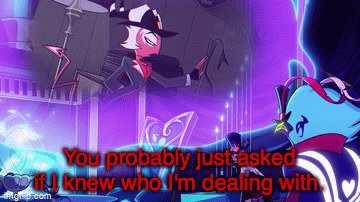
Those at the top have power but the everyday things like not seeing eye to eye and the discomfort of being centre of gossip are used to convince us they're oppressed, hitting glass ceilings and are therefore not so different from those who they have dominion over or anyone watching? The audience's empathy is what's being exploited.
Gaslight has Mel be the highest of people being that she is the messiah of prophecy who will change the world as they know it, somehow, nobody knows but that's somethibg to fear. People don't want change, this realm of no lasting death and freedom is something the rotlings are comfortable with, making Mel a terrifying figure and the worlds most wanted, threat level ampt up since she's a living mortal, fortunately she's not alone and her identity is virtually unknown, unfortunately that comes at the expense of not only her freedom and happiness but that of those she's close to, fortunately she gets it but unfortunately it's not the strongest of deterrent.
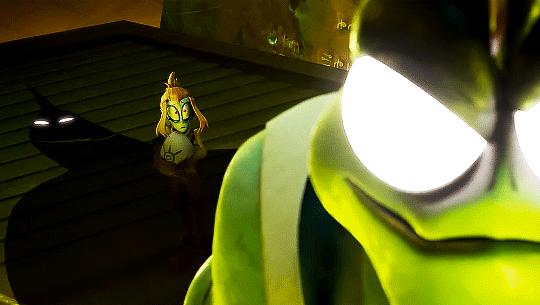
Still Mel knows what others think 'her', or what of she is, separating her from it is probably impossible.
Selfishness and consequences
Notice how both HB Stolas and TGLD Mel were bored, lonely frustrated and desperate to break away from routine and the roles they didn't ask for, so they acted selfishly in order to grasp some control and enjoy themselves, but it came at the expense of others?
Difference is Mel who is pretty much a youth watching all in her environment allowed to act with careless abandon while she can't, she understand her situation and has worked to get around it with research and an idea which will truly benefit everyone because she is a team player, but anything involving her around others is risky and she's not entirely trustworthy, poor choices, carelessness or simply being in the wrong place at the wrong time spells disaster and her guilt at this is a lot like that of those around her who have nothing to worry about, hardly any.
Mel is a bit of a "brat", happy to be get her own way but seeks praise, but she doesn't expect anyone else to change who they are, she puts in the work. Mel likes having friends and loves her family, still that doesn't change how she feels about her isolation and her recklessness constantly spells danger.
Stolas is a married adulterous dad who maybe could have divorced his 'mean' fellow victim who he shared a bed with wife since the condition of his marriage was to have a child and this already happened a while ago. He neglects his child who is seen to make an effort with him, look forward to their plans and has been forward about how she feels yet her visits are always an excuse for Stolas to hang out with Blitzø, he is more excited to have drama with his ex or dirty talk to Blitzø while in her presence.
Stolas started a reflection of his situation but not a reflection of himself, he decided he now likes the lowly member of the bottom of the social pyramid Blitzø who he coerced into a sex, sets secret tests for Blitzø and takes tantrums on him for not keeping up with all his mood swings, denies Blitzø the right to be heard, accepts his help with no gratitude and doesn't appear to like anyone.
As for his significance in the story, it is unknown or none? He is rich, nobody prevented his choice to get a divorce, he hooks up with Blitzø and his affair is known and just fine, he's bored in his big house alone, watches dramas and eats sad meals, decides his predatory ways are now love, he freely approaches fellow royalty and we learn that he is protected from the harsh treatment that a commoner would be subject to. We are entirely expected to just route for him because he's sad, he bought no threat and was hardly threated, especially nt during his banishment. He he had the power to ruin IMP but there wasn't even so much as an empty threat, a simple dangling of a carrot was enough for Blitzø to take one for the team, suck it up and hook up.
Heiracy is an explanation with no meaning, Charlie also suffers from assumed power just being a means to an end, the excuse as to why they can do what they want but how does being royalty with extra magic all work? What is expected of them? What damage are they willing to do? What do they hope to learn about those they lord over and this one goes out to well meaning work shy Charlie, how will they make a difference?
Side characters
HH and HB have a tendency to have extras outshine the leads by bringing us their own side story that has little or nothing to do with any founding plot with the leads featured in that episode are there just for show.
Alternate Stolitz Fizz x Ozzie's two episodes in season two (that absolutely neutered both of them), we follow their daily lives. Fizz goes out and bumps into Blitzø who he fights with but they make up because their devide was down to an unnamed extra, as Blitzø takes little responsibility for the accident they were both involved in and talks over Fizz, we quickly move on from that important long awaited lead character origin story.
They bond over their hookups with royalty and it didn't matter that things aren't positive for Blitzø, Fizz just talks over him without question and concern. This episode served to let us know that Ozzie the lust sin believes in consent and their love is true, the next episode Ozzie calls on Blitzø for no reason other than to double down on manipulating Fizz, the reason he gives when having Blitzø show up was actually a lie because Ozzie was always allowed everywhere, can size shift and teleport, but nothing comes of this which could have been an excellent character flaw for both Ozzie and Blitzø, lust god in love and clingy intrusive guy are possessive and shady, not a bad concept but no, they're good and right and that's where this topic ends, nevermind Fizz being smothered the previous episode too and his objectification being called out by Striker the "supremacist".
Fizz and Blitzø's flashback served as Mammon and the creep guys introduction, creep guy had nothing to do with the creeps Ozzie was concerned about and new side characters Mammon being blamed for side characters Ozzie and Fizz's issues rendered them irrelevant after hogging two episodes where there was nothi g to fear in the end and Fizz for the most part was pissed off with Blitzø's presence, and again, why was Blitzø in this episode? To serve as a reminder of who's show this is?
The take away was to lets know what Stolas x Blitzø could have.
Moxxie's dad Crimson wanted fellow new extra Chaz to join the family for financial gain so planned to marry him off to his married son, he didn't know that they were exs and it made no difference, bigamy clearly isn't a thing while adultry is here and Crimson barely acknowledged Millie. Millie didn't care to be acknowledged and gave nothing either unlike Moxxie who made an effort with her family. Chas was also Millie's ex which made no difference to anything, we learnt nearly nothing of Chas x Moxxie and a fat nothing of Chas x Millie. Millie slayed a bunch of no name extras infront of Crimson and Chas who she despised. We never know why Chas wanted to be part of this world and he has no chemistry with his soon to be father in law who we see to be competent in a later epidode whe he let Ozzie know he had kidnapped Fizz.
There were no consequences for Moxxie leaving this world, we are left to presume threat because gangster, just as we are to presume bigotry and 'supremacy' because Southern.
Crimson not caring about what his kid had to say is fair enough, what's Millie and Blitzø's excuse?
The takeaway was 'bad daddy and mother is no more' which was executed fine in the small flashbacks, otherwise the rest of the episode served as introduction of various characters featuring in the same shots but not mingling with each other. Standing togeter and having zero connection is pretty much the foundation of parent series HH, which is much more convoluted that HB and the reason why I leave it there.
HB is morphing into a vaguely connected anthology with an ensemble cast while HH seems entirely about showcasing an ensemble cast then picking where to go from all that's been layed out and who's the flavour of the month. They do good at letting the most eccentric characters who all happen to be someone in society the opportunities to flex on us, those who aren't as showy like Charlie don't get a chance to shine and those who aren't so flash like the whole IMP crew have as good as served their purpose because who cares about the stories they sold us? It isn't good to have a not one but both leads of their shows reduced to extras while their secondary leads may, like the many side characters, get a moment that will make no difference the next episode.
Gaslight has pretty much everyone it from the leads to the named extras get quality content.
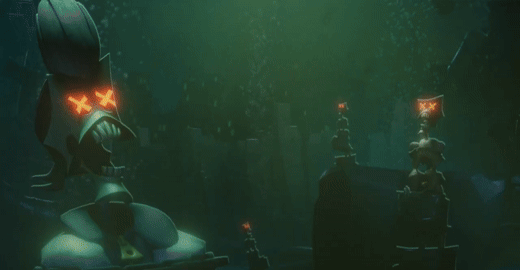
We see that the four lead characters can be very friendly and social people, the restaurant wall is full of smiley pictures of the family and the workforce whose names are all known, but family comes first, they can't risk gossip and will take out anyone who could out Mel's secret no matter how much they're liked, this has been done in the past and is done to again for us to see, twice.
Jack's dialogue indicates that Mel and Ken give off the impression that Mel's secret is just between the two of them, so where does that lead fellow family members Mud and Breadhead? This is Jack's question but in his panic he follows up with another question giving Mel the opportunity to vaguely give an answer that may have covered both or just one question. Good writing, shows further how terrified Jack is and that Mel can think on her feet. Mel's conversation with him is calm, slightly friendly but very smug, again good, really adds to the mobster running business employees beware background.
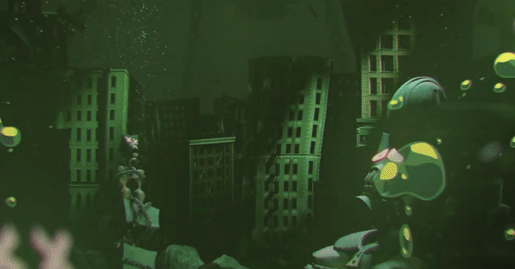
Though will we see him again? Maybe, rotlings have eternal life, we know he's liked and take the hook floating down to Jack after learning Mud sleeps on a meathook, fortelling?
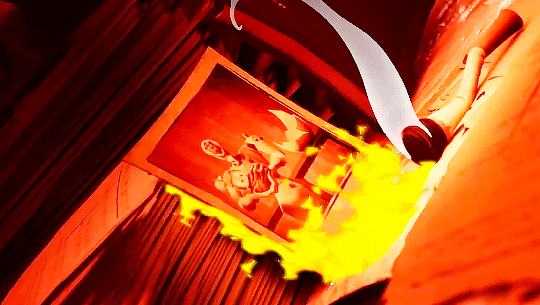
We meet Temperence who is not only in on Mel's secret but he has physical documention on her, he has become too much of a risk for Ken to feel comfortable keeping around. He is terrified of Ken and instantly knows he's there for no good and his assumed position of power means nothing, which is made more interesting as we see that the virtues, this class of gatekeeper who are carrying out mystery work, maybe no match for the public if only they rose up.
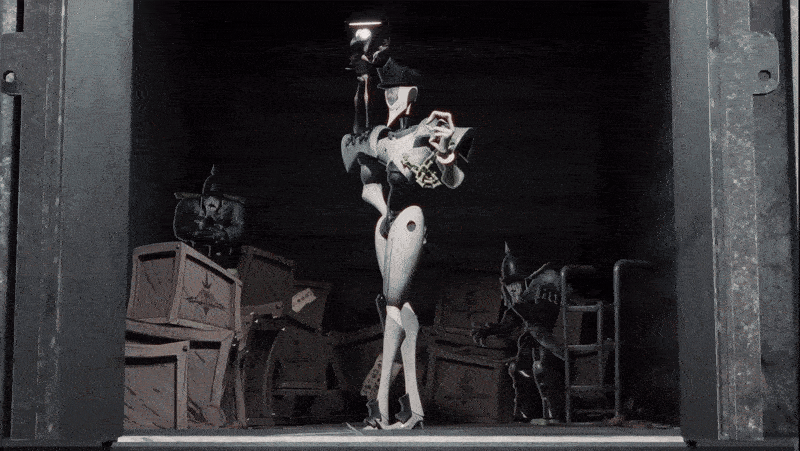
Diligence is a sadistic individual who casually tortures the rotlings who resemble the population surrounding the lead family, they accept his actions with a thumbs up, but Ken dispatching Temperence makes it seem like they don't need to take such abuse but they do, the virtues are another group built different, they seems like cyborgs Both Ken and Mel casually insulted the general public when secretly discussing her plan in the freezer, they believe them to be easy to manipulate too, so Diligence in his high place being like a god to them makes sense, they are sheep who don't know their own power, clearly they will follow Diligence's lead if he were to set them onto the lead characters.
Virtually all the no name extra need little incentive to attack the lead characters following their hoax being ousted infront. The way of life is possibly threatened and everyone knows why, which renders the masses the biggest threat, which the synopsis pretty much tells us!
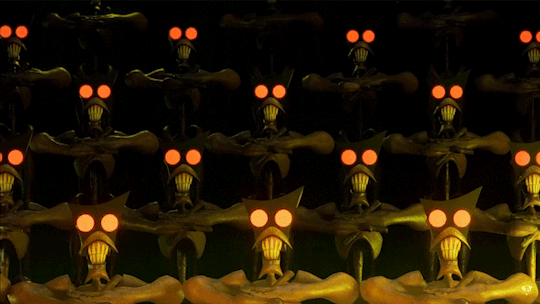
#hazbin hotel critical#hazbin hotel criticism#helluva boss critical#helluva boss criticism#side by side#long post
18 notes
·
View notes
Text
四樓的天堂 | Heaven on the 4th Floor (2021)
One drama has crept into my life during the last days of 2024 to become my favourite one I've watched this year, and I barely know how to start talking about it. But let's give this a go anyways.

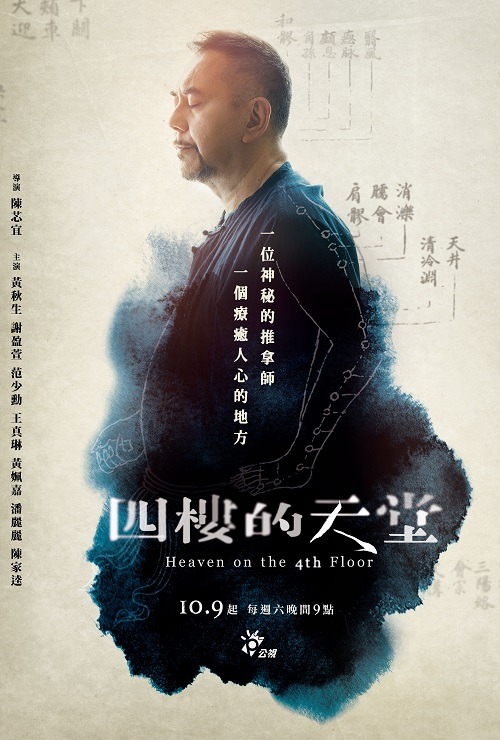
Heaven on the 4th Floor (四樓的天堂) is a Taiwanese drama starring Anthony Wong, Hsieh Ying-xuan, and Fandy Fan. I would call it mostly slice-of-life with some melodrama, as there's no strongly focused overarching plot. Rather, it follows a cast of characters and the struggles/hurdles in their lives they have to face, all of whom are helped/guided by the something all of them have in common— seeing a tuina masseuse named Tianyi (Anthony Wong).
I don't quite know how to describe the way this show develops, as everyone's arcs separate and overlap at different times, but I would say Heaven at its core is about healing. First and foremost about healing the relationship one has with their body and oneself, but also those with other people, with the past, and with the present-day world around someone. There's some interesting juxtaposition between the physical healing Tianyi can offer his clients, and the mental healing Hsieh Ying-xuan's psychologist character provides for her own, with a look at how one cannot do the work of the other. Some characters are recurring throughout the show, others you get to watch take a step forward in the span of one episode, but eventually, no one remains where they were at the beginning.
The character who has the most growth throughout all this, in my opinion, is Fandy Fan's Yuzhou, a young graffiti artist. It's by meeting Tianyi that he gradually manages to stop hiding from the past, but also start looking with hope toward a future, and find a way to be better in tune with himself, his body, and the art he creates.
Aside from healing, Heaven is also about loss, and how someone reckons with it. Past loss (the disappearance of one's loved ones, the yearning for something you never got to have), present/recent loss (the death of a family member, the ending of a relationship), and loss that inevitably lies ahead (the destruction of one's home and the fight to resist it, even if it's all in vain). Characters war with their grief and are forced to find ways to release and gradually accept it, and while my heart ached for different people at different points in time, it was beautiful to watch.
I cannot stress enough that with all this combined, Heaven is one of the most cathartic pieces of media I've ever seen. I cried an unexpected number of times, from the beginning of the show to the end, and it was never, ever in a bad way. The three leads especially did a truly incredible job bringing the viewer into their lives, taking them along for the emotional ride, and I wish all the actors had won awards for that (only one of them did, but she truly deserved it).
Production-wise, I also adore the quality of this show. It's somehow very soothing to watch, visually, and the accompanying soundtrack made me tear up several times. I had to shake myself out of a daze every time I took a break from watching; it both felt like I'd run a marathon, but also had been sitting still, head quiet, and had had someone tell me not to worry about anything else in the world for a while. (It also made me feel more physically present in my body. My shoulders haven't been un-tense in years, and I think thanks to Heaven I'm going to have to do something about that.)
In addition, this isn't the main focus of the show, but queerness is worked into it in wonderfully ordinary ways. There's more than one queer character and a trans character who show up in this, and one protagonist who is either heavily coded as or possibly explicitly aroace spectrum, depending on how much you read into it. Her arc ended up being one of my favourites; the show deals with her relationships lining up with aroace experiences in a way I haven't really seen onscreen before.
Overall, I'm absolutely going to rewatch Heaven in the future, when I feel that I need to return to that story. If you want a grounded, very character-driven show to get gently lost in for a while, this is it.
(Though admittedly, I know this drama definitely isn't going to be for everyone. It's a little bit sleepy-going, and not everyone is interested in or is braced to deal with the emotions of the story. Normally even I'm not, but here I am. However, if you're interested, here's the trailer for Heaven on the 4th Floor:
youtube
And I don't tend to do this, but I'm also going to toss out two tracks that sound how this show feels, to me: In My Breath Again from the soundtrack of After Yang, and 披星戴月的想你 by Accusefive. Sit with those for a while and see what you think, if it helps you decide whether to watch or not.)
Note: Unless you have Taiwanese Netflix, you're gonna have to jump on the pirate ship to find this show. However, as far as I'm aware there have never been English subtitles made for it on any site, so if you can't read the Traditional Chinese in the episode raws, then you may have to sit this one out for the time being.)
#behold: the latest place my fandy fan kick has taken me#this drama is an absolute fucking gem. i tried to be eloquent here but uhhhhh let's see how well it worked#四樓的天堂#heaven on the 4th floor#ashton originals#anthony wong#hsieh ying-xuan#fandy fan#ashton's recs
26 notes
·
View notes
Note
What are your favorite tropes or plot points in Jason fics and why do you like them???
That’s really hard for me to narrow down. I will read just about anything gen that’s Jason-centric. Usually what makes or breaks a fic for me is the quality of the writing and characterization, rather than specific plot points or tropes. That said, some things do stand out…
Competent Jason, my beloved, how I adore you. He’s makes killer (ba-dum-tss 🥁) plans, he can adapt on the fly, and he’s got the range and depth to go up against anyone.
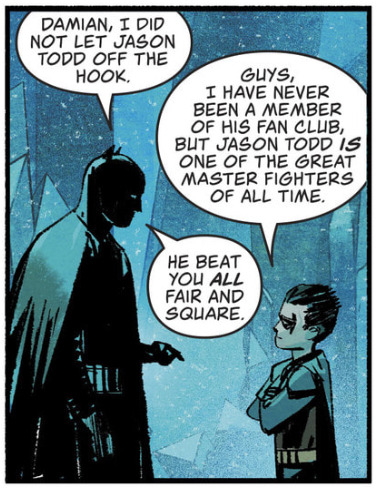
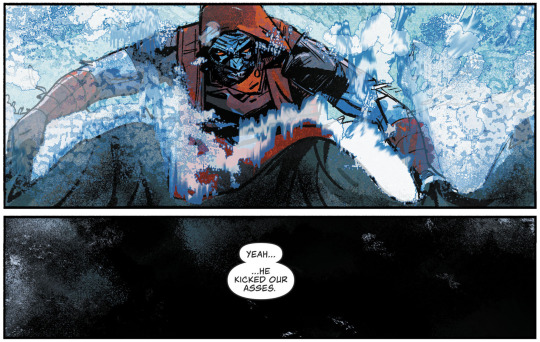
That’s my boy, any story that celebrates this is golden in my book. (Images from Event Leviathan #3)
I like Bruce and Jason origin stories, or stories that deal with them being father/son and Batman/Robin, because these boys love each other so much and, honestly, I just want them to be happy together.
I like fix-its or what-ifs that center around the Lost Days/UtRH timelines, because Jason’s story is a goddamn tragedy and I like thinking about all the ways it could have gone better/differently.
I like stories that feature late UtRH or Outlaws era Jason where he goes through real growth and development, because dc refuses to give us any meaningful character evolution without ripping it away or undermining it, and I have to feed my soul somehow. Bonus points if Jason gets to be badass with his guns or sword (or both 🤤).
I’m always up for a story that deals with batarang incident, although preferably not Dick-finds-out-and-runs-off-to-yell-at-Bruce, been there read that. Also, time travel or alt universes where Red Hood is there for Jaybin, because of all the lovely angst and hurt/comfort (and when it comes down to it, time and time again, Jason can really only depend on himself—thanks dc 🖕).
Finally, I’m weirdly lowkey obsessed with Selkie!Jason. There’s just something about baby Jay as a baby seal that melts my heart. Plus I think the vulnerability of the Selkie coat mythology is a really good fit for Jason’s character, which is so often held hostage to the narrative or other characters.
I could go on, but that’s probably enough for now. Thanks for the ask, anon! 💙
80 notes
·
View notes
Text
I have some conflicting feelings about Oliver Stark right now. Not regarding his portrayal of the character (he’s doing a great job) but 1) his views of said character, his journey, growth and potential, 2) the ways he chooses to express and word those views.
Disclaimer: I admit these feelings of mine may be a bit misguided/overexaggerated at the moment for obvious reasons. Just ranting about what irks me. No hatred or accusations towards Oliver.
What rubs me the wrong way about all his interviews after 8x06 is his pure excitement, joy and strong desire for Buck to explore his bisexuality in fun ways with total disregard of how it came to be and what he already experienced (yeah I’m talking about his first queer relationship). He seems to be absolutely thrilled to immediately move onto the next fun (that’s the reoccurring theme) adventures. No genuine interest, engagement, reflection, empathy or gratitude regarding bucktommy arc during or after.
Since s7 there was a lot of talk about Buck figuring himself out after discovering he’s bi and it was said repeatedly loud and clear that it’s about Buck only. I get that Buck is the main and it’s no doubt his very personal journey that doesn’t need to be diminished to or overshadowed by someone else. But why was it so important for OS to completely isolate the story from Tommy (first queer LI) in his narrative, while other characters’ significance to the story (mostly their support) was mentioned regularly? Why his speculations and wishes for exploration couldn’t be interwoven into bucktommy arc? Why Tommy was never considered as means to/guidance/support/contradiction for the desired exploration (be it self-exploration, romantic/sexual/relationship dynamics, being part of the community, experiencing struggles etc)? I’m not talking about OS influencing the script, promoting the ship, going out of his way to defend it or speak out on any issues. I’m talking about opening up to opportunities of current canon relationship in terms of its impact on character development and not disregarding the whole thing as if it didn’t exist or mattered.
I guess I’m just confused what bi exploration and development exactly OS wants for Buck? Why could it only be done with single Buck? Why didn’t we see anything like that to this point and now it’s the logical next step as if Tommy was a nuisance the whole time (wasn’t important in bi realization and didn’t allow for fun adventures to take place during the arc). Why now OS rhetoric changes from distant and indifferent to anticipating and excited? He was so “honoured and humbled” with bi arc and talked about importance and intention of handling it with care, but now it’s just a fumbled relationship with no importance to it, quick recovery time and free way for bi Buck to sex it up both ways. That’s the development? I’m upset and baffled…
! Not blaming him for the actual plot (hoping he didn’t have anything to do with how it turned out), only thrown off by his perspective (at least the way it was perceived by me).
39 notes
·
View notes
Text
Schrödinger's King in the Bird Box
Time for a return to the single topic that most torments me in this entire franchise canon: is Harrow in the goddamn bird or not?
Except not really. I'm not going to go over the evidence again. I've done it before. Almost everyone has done it before. It has only gotten stronger. At the absolute minimum, an attempt was made to put Harrow in the bird. That's not really disputable. I admit it. It's over.

This is actually the second time that I've struggled with narrative cognitive dissonance regarding a real core factor of this show (like not "what's the deal with Archdragon reproduction," but something that is clearly supposed to be thought about with the intent that it will eventually make sense), and eventually managed to rotate it so hard in my mind that the way I wanted to see it slipped out of my grasp and I saw it the way it's actually intended. Ironically, I think I may have been thinking about the Ocean arcanum at the time.
Anyway, what previously always bothered me about this question was mainly two things:
It would have a devastating impact on Ezran's character development if Harrow reappeared during s1-s3, but the timeskip and arc of s4-s5 made it so it would also be deeply weird for him to reappear before the show ends.
If Harrow is in Pip's body, both Viren and Pip's subsequent behavior, as well as how Pip is treated by the narrative on a meta level, make absolutely no fucking sense.
But... if Viren doesn't know whether the spell was successful or not? If we are meant to not know whether the spell was successful or not, because it's not going to get resolved in the show itself?
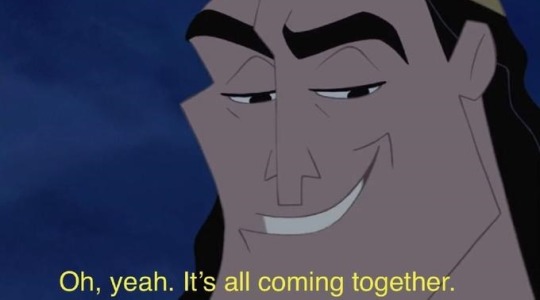
If we accept that the earliest point with any chance of the hooks for this plot being set is late s7—because yes, Aaron Ehasz would do an exact beat-for-beat repeat of Zuko and his mom—that both puts Ezran far enough in his growth for it not to be threatened by the "real" king returning, and keeps Harrow out of the loop for long enough that it doesn't really make sense for him to do anything but step down from the throne in favor of Ezran, anyway. As for Viren and Pip's behavior, if the show isn't going to advance that plot much further during its runtime, there's no reason for us to be constantly reminded of it. The setup has been made, and they can just let it stew because it's not actually relevant.
That being said, Viren's behavior actually does make a lot of sense if "is Harrow in the goddamn bird or not" is a question that is also tormenting him. To that end, I'll be doing some digging here on the nature and context of the body-switching spell, Pip/Harrow's behavior post-swap, and what the hell is going on in the Harrow section of Viren's dark magic dream.
The Spell is Made Up (Unlike All Those Real Spells)
First of all, I think there's been some long-term incorrect assumptions made about the body-switching spell. It's not a known spell: this is Claudia and Viren essentially flying by the seat of their pants... but we rarely stop to think about how that contextualizes the rest of the discussion around it.
The initial plan is to find the assassins and ambush them before nightfall. As Soren points out and Viren himself confirms: if they fail, the assassins will be unstoppable under the full moon and Harrow is as good as dead. Claudia decides to put her mind to that problem, so naturally she stops to flirt with Callum in the library and gets the inspiration for the spell from something he says.


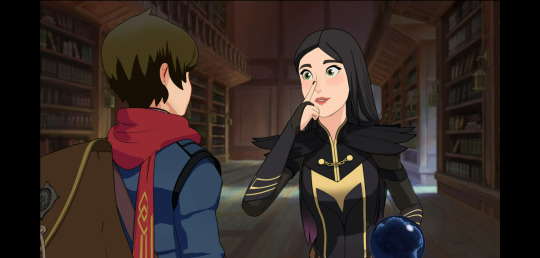
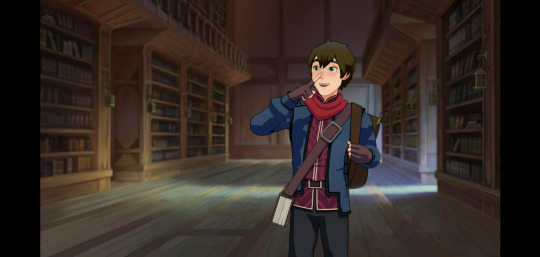

(Fun fact: none of that happens in the novelization. Zero amount.)
She brings the idea to Viren, and they develop the spell from there. It's not really clear if Claudia actually knows whether something like that would be possible, but Viren does know that transferring the essence of a person can be done—he's got a nice little coin collection that proves it.
As for the snake, there's no way Viren "acquired" a two-headed soulfang serpent because he has a book somewhere on how to use a rare, malformed specimen of a dangerous Xadian creature to switch people between bodies. He probably thought "that's weird, but could be useful," or maybe whoever sold it to him just had a great sales pitch. A non-trivial amount of success at dark magic is in having access to rarer and more powerful reagents than your competition.
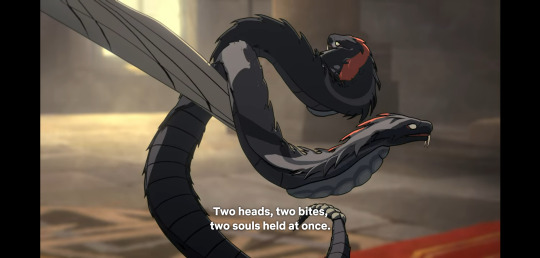
Anyway, what this means is that Viren has absolutely no idea what success looks like for this spell, particularly when using it on subjects of different species. When he describes it to Harrow, he is 110% talking out of his ass. He sounds like he knows exactly what the spell will do and how, and I think a lot of us kind of fell for that. He needs to sound confident, because if he admitted that he doesn't know if it will even work, with a possible failure condition of "snake eats your soul," well... a) Harrow rightfully wouldn't go for it, and b) he'd look incompetent, which is the worst thing ever.

When he goes to Harrow's room, he casts the spell... but did it work? I think that whatever it did, it did it in a way that Viren can't tell whether it worked or not. Maybe both Harrow and Pip passed out. Maybe Viren just didn't want to hang around for the aftermath—in the novelization, when he exits the room and runs into Callum, his eyes are still black from spellcasting.
Activities of Dr. Pip Harrow, Ph.D.
Probably the thing that has always bothered me the most about the entire Harrow-Pip theory is that yes, literally everything in the lead-up and immediate aftermath of the assassination points to that being exactly what happened... and then the narrative lens of the show completely drops the rope. Pip doesn't even appear in the novelization until Viren's pre-coronation scene, which is funny given his looming presence over half the scenes with Harrow in the show.

Pip appears exactly twice after the assassination—once in s1 and once in s2—otherwise he goes completely ignored. He's not in the background of Viren's office, or the throne room, or Harrow's bedroom. No one ever mentions him ever again. Ezran never mentions him again, in the show or in any supplementary materials. You'd think the boy who can talk to animals might have some interest in his dead dad's beloved pet... but who knows, maybe Pip has always been an asshole and Ezran's actually like "thank goodness I never have to speak to that dude again."
Anyway, in all of Pip's appearances, he behaves like... a bird. A trained bird—Harrow can rely on him not just fucking off—but he doesn't demonstrate human-like intelligence the way Bait does. That being said, Bait is essentially a main-cast character (at least as much as, say, Corvus... maybe even Soren) while Pip is a plot device, and even then it takes until well into the first arc for Bait to show the kind of complex reasoning and initiative that separates him from an unusually smart dog. Pip's human is also a stressed-out king, rather than a rambunctious ten-year-old, so he's probably a bit more sedate overall. I would personally bet, given the way the show has progressed with regard to Xadian creatures, that Pip is as intelligent as Bait.
The point of that is: even if Harrow's consciousness is occupying Pip's body, he's not really doing anything with it. He's pissy, sure:
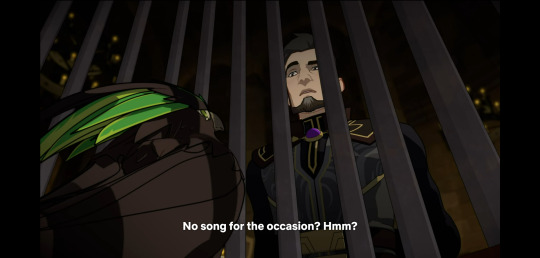
But is that Harrow's pissy-ness or Pip's? Even if Pip is only as intelligent as a trainable bird, that's plenty intelligent enough for both grieving/confusion that their human is gone and holding a grudge against obvious assholes. Viren cages him, but is that because he flipped out and got bite-y? And was it Harrow flipping out, or Pip? Or is he caged just because Viren's of the general attitude that animals belong in cages? Those who fail tests of love... We just don't know.
A lot of us also, to circle back to assumptions about the spell, have tended to think of a body swap between Harrow and Pip resulting in Harrow flailing his arms around wildly and screeching... but again, we know literally nothing about this spell, nor do we actually know anything about Harrow's behavior after Viren leaves his room. Maybe his body sat catatonic on the bed until Runaan came in and shot him. Maybe Pip, being intelligent, was able to maintain the facade—once everyone's in the heat of battle, it would be hard to notice even significant deviations from normal behavior. Even if "Harrow" appeared to fight only halfheartedly, or give up entirely... well, he hasn't been the same since he lost Sarai. Maybe the spell only partially worked, and only half of his soul is inside Pip, with minimal or no influence over the bird body's behavior.
Viren does appear to take some precautions in case Harrow is alive inside Pip. The cage, for one... but he also has nearly all subsequent important conversations outside of his office. Like I said earlier, Pip's cage isn't rendered in the background of any scene, but since he escapes from Viren's office I'm assuming that's where he's been. Even if Pip was just out of frame in every scene in Viren's office post-assassination through end of s2, the only things he's seen are... Viren eating butterflies, and the conversation between Viren and Claudia about the mirror and her side mission to bring the egg back at all costs. He doesn't know about Soren's instructions to murder the boys. He knows about the mirror and Viren's obsession with it (which he could have known before), but he doesn't know about Aaravos. He may know that Viren stole his seal but only if Viren was stupid enough to stamp the letters with it in front of him (which... look, he could be). The only things he's really learned are that a) his sons are alive, and b) Viren lied to him and the egg is alive.

Now, realistically, if we were meant to hang on to the is-Harrow-in-the-bird plot thread because it's going to be significant within the scope of the show... I'd be expecting to see at least one cut to Pip glowering at some point during all these machinations. If it weren't for the mirror and Aaravos, I'd expect Viren to be yelling all his monologuing at Pip, too. But the show does none of that. Instead, the next time we see Pip, we see him peace-ing out of the show for at minimum the next three seasons, and possibly the remaining two, as well. If Harrow's in there... why? Did he go to find Callum and Ezran himself? It's not actually clear that he knows Ezran can understand animals, so it would be reasonable for him to think Viren is his only chance at ever not being a bird again. Maybe he thinks that chance is gone with Viren's arrest and would rather not spend the rest of his life in a cage. Maybe he really isn't in control of the body.

Back to Viren, though: since Pip refuses to demonstrate any behavior that could be taken as distinctly Harrow's, Viren actually has no idea at any point whether Harrow's in there or not. He doesn't know if Harrow lived. He doesn't know if he succeeded or failed. It's a constant reminder that he's almost, but not quite, in control. Almost, but not quite, good enough to achieve what he wants.
It probably drives him absolutely insane.
Did You Think You Were Somehow Getting Out of This Without Me Mentioning Kpp'Ar?
Just kidding, it's finally time to talk about Viren's dream. We've gone two entire seasons and a two-year timeskip without any mention of Harrow or Pip (though those maniacs dropped the fucking snake basket on us as an incidental but obvious prop early in s4), and then suddenly we get punched in the face by Viren's subconscious.
First, though, I do actually need to point something out in the scene with Kpp'Ar. Bear with me, I promise this is relevant.
Viren sealed Kpp'Ar's soul in a coin 12-ish years ago, and the coin has been sitting collecting dust in his secret dungeon for... some amount of that time. Now he opens the door and finds Kpp'Ar standing there, free—and I will note that I don't believe Viren actually knows how to free people from the coins, or whether it can even be done. His reaction is surprise, followed by suspicion and wariness:


When he encounters Harrow—dead—his reaction is horrified shock, which is fair since the last time he entered the room that way there was no surprise body chilling out waiting for him in it:

Then, when Harrow speaks to him, suddenly alive and unharmed, he drops straight into relief:
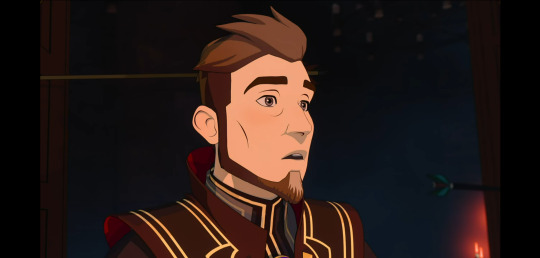
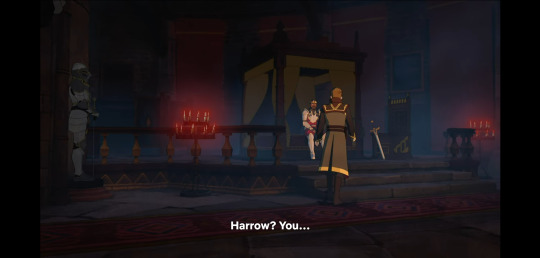
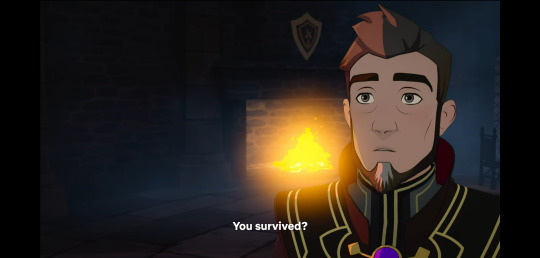
Some of this is undoubtedly due to the differences between Viren's relationship with Kpp'Ar and his relationship with Harrow. With Kpp'Ar, after that initial moment of confusion, he's absolutely determined to not show a single hint of ignorance or weakness—this is a trick, or a test, and a passing grade in "light verbal sparring with the mentor you're pretty sure you remember betraying" is a thing that is both normal to want and possible to achieve. For Harrow, who he wants so desperately to call him brother, who he walked into this very room ready to die for, before everything went horribly awry—he not only immediately and willingly goes to his knees, he literally prostrates himself.
... I'll give everyone a moment to get all the innuendo and suggestiveness out of their systems, because that's not the point. This time.
What is the point is that Viren's reaction to Harrow isn't disbelief, but relief. Hope. Kpp'Ar is supposed to be in a coin, and Viren immediately questions how he got out. Harrow is supposed to be dead but Viren doesn't give a second thought to how he's not. Fortunately, Harrow helpfully explains:
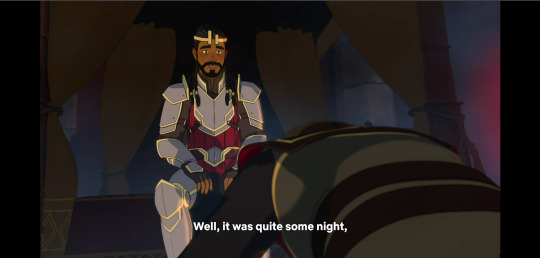
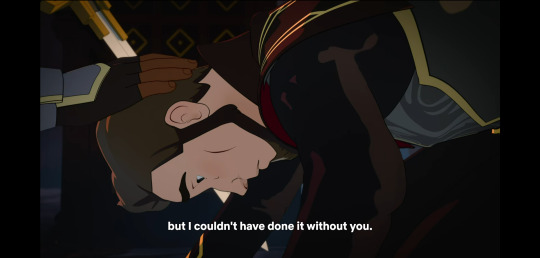
Fun fact: back in s1, we don't actually see Viren actually taking action against the assassins. We don't even see evidence that he re-entered the room at all—it's only Soren and Claudia who participate in Runaan's capture.
I haven't actually touched a lot on the complex shit going on for Viren, emotionally, throughout all of this—I mentioned it's was probably driving Viren insane over the course of the first two seasons, but let me elaborate. If Viren successfully switched Harrow and Pip, that means Harrow survived... but he expressed his feelings on the proposal in no uncertain terms, and there's a good chance he will literally never forgive Viren. I don't think Viren thought far enough ahead to consider how to get Harrow into a human body again, but I do think he's dragging his feet on it a little because if he can work things to his advantage—unite the Pentarchy against Xadia and follow through on the war Harrow was avoiding—he'll prove to Harrow that he was right all along. Any chance of that flies out the window with Pip at the end of s2.
If the body-switching spell failed, it means Viren essentially killed Harrow himself. That's the reality I think he grows more and more resigned to over the course of s1 and s2, when Pip remains unresponsive. He had no choice but to take the best chance at saving someone he loved—but this time, instead of saving Harrow, he murdered him.

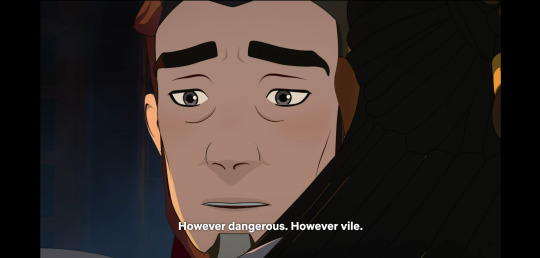
In the dream, Harrow has not only survived, but credits Viren with his survival. He doesn't just dismiss Viren's show of remorse, but makes his own apology to Viren. He calls Viren brother. After an impossibly long nightmare, everything is okay. All is forgiven. Maybe there was nothing to forgive, in the first place. Maybe Viren was right all along.
Then it all turns sinister with the callback to the coin incantation, and we have a sharp return to reality:
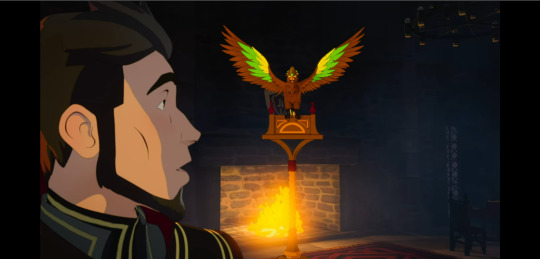
The cinematography here treats Pip a lot more like how I would expect him to be treated in s1/s2 if we were meant to know he was actually Harrow. There's focus actually on him, instead of just other characters' reaction to him. He "speaks"—as I noted in another post—in raspy sounds very unlike his songbird chirps from s1. This is absolutely Harrow as Viren actually left him—even if he's not dead, he's in a warped prison of dark magic, a perverse mockery of himself.
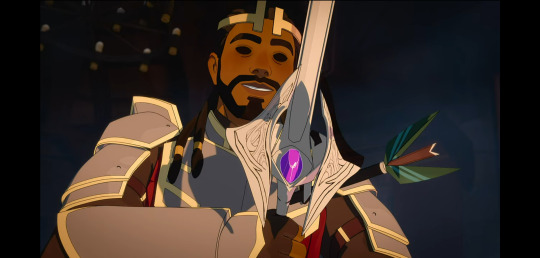
Oh wait.
Harrow-who-is-both-human-and-alive was never an option, and what we've got now is mirror images of Harrow-the-dead-human and Harrow-the-live-bird, and they're going to do to Viren what he did to them.
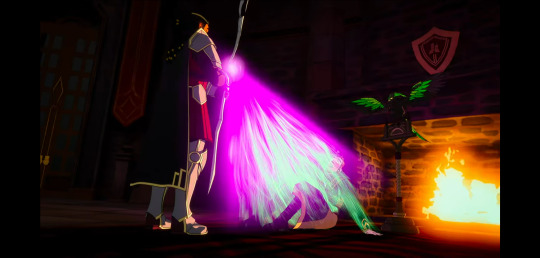
Now, it's not that none of this makes sense if Viren knows for sure that Harrow is in the bird... but it makes a lot less sense and has less emotional resonance. If Viren knows Harrow survived as Pip, he'd be more likely to question Harrow's human form than his survival—the way he does with Kpp'Ar. He might be more guarded, expecting hostility—which, I will note, is what he gets when Pip enters the scene. Instead, because until now he believed that he actually killed Harrow in his attempt to save him, he's so relieved to see Harrow alive that for that one moment he loses all pride and is ready to beg for forgiveness at Harrow's feet.
Since legitimately none of this makes sense if Viren didn't at least attempt to put Harrow in the bird, we're left with Harrow maybe or maybe not alive, Viren having maybe or maybe not been the one to actually kill him (gonna be a fun one with the Runaan context), and a plotline that is definitely not going to be resolved in the remaining two seasons of the show. I'd be kind of surprised if they even did any more setup for it (like Callum/Ezran finding out it's a possibility, or even a hint drop like Runaan being all "it was fucking weird, he just sat there" or something) outside of future supplemental media.
Conclusion
Either Harrow is alive and in the bird, with the future intent being to do a spinoff story The Search-style, or we're in for a huge bummer of a "actually, it was Viren all along who killed Harrow, therefore Runaan is a good guy and we can all be one happy family" pile of absolute bullshit. Yes, they said Harrow's dead. Harrow's body is dead, we knew that all along. There's a note in the artbook that Viren was actually going to rip the shroud off at Harrow's funeral in order to publicly prove it's his body, because that is an extremely normal thing to do.
The show just treats it extremely weirdly because, even as the only person with any chance of knowing, Viren is in the same uncertain boat as the rest of us. (Actually more uncertain than the rest of us, since he's not genre-aware.) Also it's another chance to torment Viren emotionally, and they'd never pass that up.
Thanks for coming to my absolutely ridiculous TED Talk on this topic, I hope this screenshot now does as much psychic damage to you as it does to me:

#the dragon prince#viren#harrow#pip#for once i was wrong... but now i'm right#oh my god this is so long i'm so sorry#kradogsmeta
134 notes
·
View notes
Text
If any writer is out here seriously arguing that Characters in a TV show shouldn’t have growth because of the nature of the medium, fucking run. Run from their projects. They will be bland, tired, uninspiring, and boring.
TV characters don’t grow or change *in the same way* they would in a movie or novel. That’s the key phrasing here: in the same way. When a movie or novel ends, many of the central problems and conflicts specific to that book or movie have been resolved. A TV show is built on a series of ongoing conflicts, often with one overall larger situation pushing the plot forward or tying the narrative together. Think of ATLA. Every week, the characters landed on a new island and had someone new in need of their help, but the overall larger conflict, the war, always loomed on the horizon. The episodic plots created growth while the overall serial plot created great change, and each character still maintained their “sense of self.” People have mistakenly begun to argue characters maintaining this “sense of self” and an ongoing source of story means they do not grow or eventually change. That is incorrect.
Aang matured and learned to control his powers, but he is still kind, loyal, and sticks to his conviction that he will not kill to end the war. Katara became a master water bender who can hold her own and protect her own, but she remained passionate and strong. Sokka found a sense of purpose and self-identity, but he remained intelligent and witty. Do you see what I’m getting at here?
Walter White changes in the sense he becomes more morally corrupt as the series continues, but what doesn’t change is the fact he’s cooking meth. The overarching conflict-driving situation doesn’t change for the characters until the very end, even if episodic conflict-driving situation ends or the character is dynamic. ATLA ended when the war ended. The Sopranos ended with an abrupt cut to black meant to be interpreted as Tony’s death (confirmed by the creator). Mad Men ends with Don Draper— a character plagued by emotional suffering and who was characterized as unable to change for the better— meditating on a hilltop at a retreat before the show cuts to the real-life 1971 Coca-Cola “Hilltop” commercial.
A TV show isn’t one long story, but a series of shorter stories that tie together. Episodes have their own beginning, middle, and end. The show itself doesn’t necessarily have that, especially given the modern TV landscape where shows get canceled after one or two seasons all the time. There’s no planned end because the end could be in a couple seasons or this next season. The writers have to figure out an end for the show only when they’re faced with its end. Until that moment, though, each episode is its own story, and each episode’s end is supposed to leave the story with possibility for more stories to develop or come, but the overall plot-driving conflict does not resolve until the end.
The issue with 911? There are a couple characters with what seems like no overall plot-driving conflict fundamental to them. Buck’s story doesn’t revolve around evading the authorities and doesn’t end with him fittingly dying among the meth that corrupted him. Hen’s story doesn’t end when she fully realizes her powers and defeats the warlord threatening to burn the world to the ground. Of course, yes, because that’s not the genre they’re in, but that’s not the point I’m trying to make here. They seem to no longer have an overarching source of story. Not like Eddie. Not like Bobby.
Or, at least, production is not utilizing these character’s source of story.
Bobby’s past struggle with addiction is an ongoing source of story for him. Eddie’s past loss of the love of his life is an ongoing source of story for him. The reason Athena became a cop in the first place; her motivations, is an ongoing source of story for her. The abuse Maddie suffered in the past from Doug is an ongoing source of story for her. None of these traumas are things that will change about these characters. If Maddie stops picking up phones to help people at their most vulnerable; in their greatest time of need, and Athena hangs up her badge, and Bobby retires and comes to peace with the lives he’s lost and saved, and Eddie forgets Shannon, these character’s stories end. Boddy, Athena, Maddie, and Eddie’s stories are shaped by ghosts in their past. When those ghosts finally rest, these characters will see resolution.
But Buck and Hen do not have the same ongoing source of story. And I know the writers have realized this because Minear himself characterized Buck as being on some sort of character “hamster wheel.” There’s nothing driving his story forward.
And fans have noted the same of Hen, joking about “Hen and Karen lose their kids, part VI… 😒.” Karen, actually, has more of an ongoing source of story than Hen, with Karen’s ghost being that she does not share DNA with her any of her kids, making her claim to motherhood vulnerable. We see this cemented by the IVF storyline and how devastated she was that her body could not give her a kid recognized by the state as her’s and always hers. Hen’s ghost was Eva Mathis, who also became a source for Karen’s ghosts (“Everyone I ever loved belonged to you first”). But Eva hasn’t been seen since season 5’s “Ghost Stories” when she fucked off out of their lives and told both Hen and Karen that she’s leaving California and won’t be back. And 911 completely dropped the Nathaniel (Denny’s dad) plot line, so this ongoing source of story was essentially resolved. But the show recognizes the situation it created and continues to recreate this ongoing source of conflict with new antagonists trying to take Hen and Karen’s family from them, instead of using those past ghosts.
But what the writers seem to have neglected in their resolution of Hen’s past ghost (Eva) is that Hen’s ghost wasn’t ever legal powerlessness over her kids because she didn’t physically birth them and never could get pregnant like she’s long wanted, as it has been Karen’s. Hen’s ghost is the life she had before Karen (see: Hen begins, as the begins episodes do a good job of revealing what each of these characters ongoing source of story will be). Her ghosts are Eva and Daniel and pharmaceuticals and watching someone she loved succumb to addiction and repeatedly blow up their lives. Her ghost is also a different form of addiction: an addiction to chaos or danger or excitement, previously in the form of Eva. (And I think that’s part of what made Hen and Bobby’s relationship feel different from Bobby’s relationship with other members of the 118. Bobby struggled with addiction and Hen knew what it was like to lose people to it.) While Karen’s ghost is the fear of losing her kids (she became a stay at home mother and everything), Hen’s *could successfully have been* the reason she became a firefighter in the first place: a desire to save lives, especially after seeing people she knew almost lost or totally lost to emergency and illness. She goes from working for the industry that started our addiction epidemic to saving lives impacted by it, and the ghost that drove her to do that would have been the past love she lost to addiction. Her ongoing source of story would have mirrored Bobby’s in a way (potentially setting up nicely a poetic end where he passes the torch to her, also bringing her full circle from a probie intentionally left out to the woman with the run of the house), in that she is driven to save lives because of those she’s lost or almost lost. And it is easily a part of all her arcs, like when her mother gets sick or when Bobby relapses or when her kids or wife get injured.
Luckily, I don’t think they’ve screwed the pooch by writing Eva off. Eva could return. Hen’s past as a pharmaceutical rep could come back to haunt her. This narrative of “this is why I became a first responder” *has* permeated Hen’s entire story, it’s only recently that it seems like her story is repeating itself. I think resolving this issue would 1.) require the show to see Hen as more than “the show’s lesbian with a family,” and 2.) a simple jolt of creativity. Production can let someone new come up with an idea or hire other staff or whatever to bring in some fresh perspective. I really think this is solvable and they have the resources to take Hen’s story in a refreshing direction.
Which I want to compare to another character in the show, Buck.
Buck is also stuck in a cycle. Buck’s ongoing source of story has always been about creating “emotionally weighty” relationships due to an emotional neglect he suffered as a child. It’s why he slept around. It’s why he often feels a sense of abandonment and derived purpose from his work. It’s put him at odds with his sister, Maddie, at times. His ongoing source of conflict; his ghost, is his parents (and Daniel) and how this created an emotional wound Buck wants to fill. We see that he had this open wound early in season one, mostly around a desire for emotional intimacy and feeling a lack of a sense of place or significance. He tells Bobby that his job as a firefighter is all he got, he suggests to Maddie that she cast him off for Doug, he tells his sister he’ll make something of himself one day but doesn’t know what yet, he and Taylor talk about meaningful relationships (he’s surrounded by them), he confronts his parents past emotional neglect (and forgives them), he also takes on his subconscious about “mattering” more in a made-up world, and toward the end of season six, he concludes that he is enough; he has all he needs in the real world and then comes to peace with the fact he doesn’t have to perform for others (something which he’s been doing his whole life to get the attention and approval of his parents). And the issue with this is that, well, Buck finding a sense of purpose outside his utility and finding innate value in who he is (this idea he is enough as is) in season six kinda sorta wrapped up his ongoing source of story. They even tried partnering him up with a nice girl (which is unfortunately revealing of the fact they think Buck’s sense of significance and his struggles with loneliness are tied to his romantic struggles as opposed to emotional abandonment as a child by his caregivers).
The writers or the creator unfortunately seem to want to argue that Buck’s ongoing source of story is his lack of a romantic relationship, rather than finding purpose with his life and struggling to build or maintain a community of emotionally weighty relationships around him as life brings people together and draws them apart. We saw this illustrated well in his arc with Red, the retired firefighter. Buck is worried about dying alone, but not really because he doesn’t have a significant other at the time. He’s afraid of this because of the response his coworkers/friends gave when he asked if they ever keep in touch with former coworkers. Part of Red’s story may have been that he let the love of his life go, but the other part was that he never kept in contact with his old friends.
However, it seems the show’s creator wants to argue that Buck’s story ends when he finally finds “the one,” romantically. But it’s not. Buck’s arc ends when he finds a sense of purpose or innate value outside of his work (it would be really blah, boring, if that “purpose” he finds is a romantic partner, btw) or settles with the fact that he has (and always will have) an “emotionally weighty” support system because he fights to maintain those relationships despite distance, time, circumstance or a change of jobs. Buck’s ongoing source of story has always primarily revolved around his platonic relationships. The point of Red’s story was that Buck is not Red, Maddie even says that Buck will never be alone because he has her. And while it could be argued that part of Buck’s resolution will be finding people who fight to stay in his life, always return, and show him that he matters to them, I think it would be shortsighted to suggest this refers (or would exclusively refer) to his romantic life. Buck will settle into himself because of the platonic and familial love he has fostered and fought for.
This means, I think it’s possible to stop giving him a revolving door of romantic partners (either commit to one or none, imho) without resolving his story when his story is about creating emotional support systems and deep connections with others despite the way life pushes and pulls people apart. Arguing his story resolves when he finds “the one” would be like arguing Chim’s story ended when he and Maddie first got together. Life pushed and pulled them apart several times, and they kept choosing each other. Chim has fought to maintain the family he’s created after the family he lost and also never got. Maddie has fought to maintain the happiness and safety she thought she’d never get. The show could give Buck a steady partner or a reoccurring romantic partner and still write narratives about the difficulties of maintaining platonic and familial relationships as an adult, including any potential expansion of that familial relationship through a romantic partnership.
In my personal opinion, if any of Buck’s ongoing source of story is related to romance, it’s his belief that his life and existing relationships will only be complete when he finds “the one.” As Taylor said, he’s surrounded by meaningful relationships (yet he doesn’t seem to find this enough—likely due to this idea he has to find romance). It could be argued that when he realizes this, and in the process realizes that he doesn’t need a romantic partnership to “complete” the picture, then his ongoing source of story will find resolution. This approach would necessitate a constant cycle of different relationships until Buck ends the series single and surrounded by—like—his nieces and nephews and friends. However, I do not think that this would satisfactorily resolve Buck’s picture (mostly because of the rather boring patterns it creates for Buck’s character and the way I think it would often lead to Buck re-hashing the same things over and over). I also don’t think the writers are setting out (or ever will set out) to tackle amatonormativity in narratives about family, belonging, and “ultimate” happiness.
Unfortunately, I do think that Buck’s narrative will continue to be stuck in a cycle of unsatisfying and incomplete or short-cut relationships until the show end-ends anyway. I think this because I think the writers and creator genuinely see this cycle as what drives Buck’s story (as opposed to just one potential aspect to include in an ongoing source of story about finding purpose outside utility and people pleasing, and surrounding himself with people who love him and who he loves in return), with the resolution to his ongoing source of story being Buck ultimately finding “the one,” and settling down with them. However, because romance has never been the primary focus of his ongoing source of story, this exclusive focus on break-ups and then moving onto the next until “the one.” will always feel unsatisfactory.
What will “save” Buck’s story isn’t a new jolt of creativity, but the creator and writers actively challenging and changing their amatonormative views of relationships. And I think that’s far less likely to happen than someone going, “What if Hen has a call about an overdose and it brings back some uncomfortable memories and new challenges for her and Karen?”
#tl;dr: if they don’t bring Tommy back that would actually make Buck’s story incredibly bland#because a constant cycle of break ups and new romantic partners misses the point on what has been the source of Buck’s story#his romantic relationships can be transformative#but still not the *primary* thing that drives Buck’s story (< which is something like a motivation or history)#because a character can grow with time. but this growth in character is not the ongoing source of the character’s story#even if it is related to or caused by the character’s ongoing source of story#Like Rebecca Welton can warm up to Ted Lasso because Ted is sunshine incarnate. This looks like it could be considered growth#but her primary source of conflict that drives her story is her contentions relationship with her ex-husband#that resolves when she forgives him for his affair or moves on and stops letting her animosity for her ex husband motivate her#You see what I mean?#TV characters can grow while still maintaining their character (‘sense of self’) and the conflict that drives their story#911 ABC#Evan Buckley
20 notes
·
View notes
Text
High School Frenemy & School 2013: A Comparison
Let me begin by saying that I’m not making this post to diminish either drama. I’m a long time fan the original Korean drama School 2013 and an excited new fan of the Thai remake High School Frenemy. As someone whose long held School 2013 in my heart, I’m so happy to see it getting a remake and renewed attention. I encourage anyone who has been enjoying High School Frenemy to check out the School 2013! Although there are definitely similarities, there are more than enough differences to enjoy both dramas distinctly.
For my own enjoyment, I’ve decided to take a closer look at the differences and similarities between these two shows so that I may better appreciate what each iteration brings to the table. I will avoid explicit spoilers at this time but may reflect more on different plot points as the Thai drama airs.
For reference: Saint (HSF) = Namsoon (School 2013), Shin (HSF) = Heungsoo (School 2013)
You can see the bare bones of the original drama in the 1st 2 episodes of HSF with core characters and the overall premise, although there are quite a few differences. School 2013 is more slice of life, following high schoolers trying to find purpose while dealing with bullying and a lack of support outside of school. It is low-key and more insular when compared to HSF which has already introduced a new conflict and new characters to the story with the merging of 2 schools. This conflict did not exist in the original drama and inherently alters the storyline. I look forward to seeing how it develops.
The heart of both stories, of course, is the relationship between Saint & Shin (HSF) and Namsoon & Heungsoo (School 2013). While Saint and Shin do share some similarities with their Korean counterparts, they are also quite different.
Saint somehow feels more sturdy and focused than his Korean counterpart Namsoon who felt softer and more blurred at the edges. Saint, comparatively, also seems to have a greater sense of responsibility to those around him - taking accountability for his father, stopping a schoolmate from smoking. At this stage of the story, Namsoon was more resigned, drifting, reluctantly doing the bare minimum and eager to leave others to their own devices. The 1st few episodes of School 2013 just begin to show Namsoon making connections with those around him. We see shades of this isolation in Saint too but perhaps HSF simply doesn’t let us sit in it for quite as long which leads into pacing differences and the introduction of Shin/Heungsoo.
School 2013 really takes its time and lets the audience settle into the dynamics of Namsoon, the teachers, and the class before introducing Heungsoo to shake things up. Heungsoo doesn’t even officially join the class until the very end of episode 3! Nevermind biting our nails to find out their backstory, we didn’t even truly know there was tea to be spilled in the beginning. Of course, School 2013 was allowed to take its time with 16 episodes while HSF only has 10 episodes and a lot of ground to cover.
Shin is quite different from his Korean counterpart Heungsoo. This is likely due to their inherent circumstances. Shin transfers to Saint’s class along with his friends and classmates. In School 2013, Heungsoo transfers to Namsoon’s school alone and without a support system. Shoved into a hostile environment on his own, Heungsoo is much more solemn and withdrawn.
This is another interesting change made by HSF. School 2013 makes it explicitly clear that Namsoon and Heungsoo had very little support apart from each other before their falling out. Even after they’ve gone their separate ways, neither makes a concerted effort to establish or maintain new relationships. As touched upon above, a large part of Namsoon’s growth in School 2013 is growing beyond himself and establishing relationships apart from Heungsoo - although Heungsoo always remains his most important relationship. In contrast, Heungsoo never really strays far from Namsoon. So for HSF to focus on Shin being the one to establish so many friendships apart from Saint shifts the balance of their dynamic in a way that is different from School 2013 and I think it will be interesting to see it play out. In spite of this change, something that seems to hold true with both dramas is that Saint & Shin and Namsoon & Heungsoo shine brightest and seem most themselves in flashbacks when their friendship is at its strongest.
The inclusion of Saint’s parents is also a major departure from School 2013 where Namsoon & Heungsoo’s parents were barely mentioned and never seen on screen. The lack of a healthy parental support system outside of school was a core theme of the original series. It’s interesting to see the Thai version directly address absent parents and include a living parent - even more interesting that they so far are still mirroring School 2013’s themes with Saint’s father clearly not serving as an adequate parental figure despite being present on screen and in his son’s life.
Other noticeable character changes include Mark Pakin’s character having an established friendship of sorts with Shin while in School 2013, this character takes a liking to Saint’s counterpart Namsoon instead and the 2 gradually form a heartwarming bond. Furthermore, in School 2013, there is only one collective group of 3 “delinquents” and they serve as the primary instigators of much of the trouble in the class. There is no ongoing feud between 2 class factions like in HSF. While there is still plenty of fighting in School 2013, it’s more one sided.
I’m also very curious to see what HSF does with the teachers. In School 2013, the teachers were a large focal point of the story and so far HSF has stayed true to key factors of their storyline.
HSF is so interesting because in some ways it feels so different from School 2013 but then they’ll have Saint jump off the school roof and I’m suddenly reminded that shit did actually happen in School 2013 too lol Despite being a remake HSF is absolutely adapting the material into its own story. As a viewer, it’s usually difficult for me to rewatch something or watch something for the 1st time when I know what’s going to happen. However, HSF is keeping me on my toes and keeping me hooked just like School 2013 did all those years ago. It feels like a familiar but entirely new experience all at once. I’m so excited to see how it progresses, especially the relationship between Saint and Shin. I wonder how much of their backstory will remain the same or change from School 2013. Even if HSF lifts their entire backstory, it will inevitably play out differently given the changes they’ve already made to their characters and the story. In any case, Namsoon and Heungsoo in School 2013 had me by the throat back in the day and I can already feel that starting to happen with Saint and Shin too. I’m excited!
If you made it this far, hopefully any of that made sense lol I’m all over the place because there’s just so much to talk about! & I’m sure I’ll think of more things I’ll wish I’d have said later but I just wanted to write down some of my thoughts. Thanks for putting up with my ramblings!
#high school frenemy the series#high school frenemy#hsf#school 2013#sky wongravee#nani hirunkit#saintshin#go namsoon#park heungsoo#heungsoon#thai drama#kdrama#coolgenie#gmmtv#gmmtv series
52 notes
·
View notes